#and being in the system like that changes how you see and view the world and beard definitely got angry
Explore tagged Tumblr posts
Text
Just to add on to this. Someone might've mentioned it in the tags, but I wanted to put my take on this thought.
[TLDR: me agreeing with OP and then explaining something vaguely Marxist lmao]
Do note that the power imbalance is also there. Yes, the two of them have their own views regarding the situation [Vi being accustomed to the reality of things, Caitlyn having to be shocked into experiencing it firsthand (and even then not the whole scope of this systemic issue)]—but their subjective experiences don't change the fact that, from a complete bird's eye view, the conflict of power exists.
We see this multiple times in the show. We see this already laid out for us, in several instances, in Season 1.
In what mad world will I trust someone like you? // Someone like me? You enforcers are all the same: just asshole criminals in fancy uniforms. We're here because I'm hungry. Do you know what prison food is like? No. Of course, you don't. Well, that place does look like it has bodies buried in the basement. // You don't know anything. You know what your problem is? // Please, tell me. // You expect everyone to give you what you want. What is this place? // It's where the kind of people you Topsiders don't wanna think about wind up. I know you have your reservations about me. This only works if we can learn to trust each other. // It doesn't work. It never has. You Topsiders always find a way to screw us. // I suppose Topside is to blame for all your misfortunes. // ...not all of them. // We aren't monsters, you know. We're people. Just like you. // You don't know anything about me. She makes...potions. Helps people here with...with...this. // ...shimmer. Why would you take something that does that to you? // I just...wanted to feel what it was like...to be somebody. To make other people afraid. Let's go. I think Vi would be happy to see a friendly face. // No! You...you go on ahead. She...she knew me when I was still...anyway, I don't want her to see me like this. Just tell her I'm sorry...about everything, okay? You used to live here...who's Powder? // My sister. I thought she died, but, now...I have to try and find her. // How do you know if your sister is alive or dead? // It's hard to check up on people from inside a concrete cell. // What, you don't have parents? // No! They were killed by enforcers. I knew it was a mistake trusting you! // You've been a real picnic yourself. Vi tells me I can trust you. You get a pass back Topside—that's it. ...it's beautiful. // If your people had your way, it'd be rubble and ash. // It's a misunderstanding. They think you work for Silco. // Your people hunt us! Like animals! Silco pays them to do it! // That's not possible. You're wrong. // Say that one more time. Ekko! She believes what she's saying, okay? We could beat Silco with this. // That won't solve things. // Easy for you to say! Your people aren't dying all around you! // Ekko...it's wrong what's been done to you. You'd be well within your rights to keep it. I couldn't blame you. But, if you do, the cycle of violence will never stop. This is our best shot at setting the record straight. This city needs healing—more than I ever realised.
[Whew. I actually had to rewatch several episodes just to get the dialogue IFBJKFBF]
Now, back to the topic at hand.
Let's start with the obvious. Whether explicit or implicit, all of these lines trace back to the systemic oppression being done by Piltover against the Undercity.
Vi was wary of Caitlyn in the beginning because she's an enforcer, and enforcers were the people who'd killed her parents. And it's not just that, either. Vi knew about Grayson and Vander's deal. She has witnessed both Piltie and Trencher working together to keep peace between the two cities. Yes, she'd been angry about it (reasonably so), but even then, she realised why such a thing needed to be done. She was even ready to sacrifice herself just to spare her siblings the inevitability of being the scapegoat. This implies that Vi knew there was at least a good soul out there, a sympathiser—who might yet grant her some kindness on the upside.
But then that sympathy got that very same person killed. And here, we finally know for true that good people don't survive the games of life. You don't get as far as you do in your existence without committing violence. The same also holds true for Vander: her father, who'd shifted his morals and priorities to protect his children; her father, who'd also sacrificed himself in the name of their family.
What does that show her? Being good gets you killed. Being good isn't enough.
Huck demonstrates this incredibly well. I just wanted to feel what it was like to be somebody. To make other people afraid. Prior to his reappearance in Ep6, we don't know anything about him save for the fact that he'd made deals of his own in the Undercity—but this is enough to tell us that he, like almost everyone else, is involved in some kind of illegal business. What does that say? Being good doesn't support your life. You have to tamp down the purest parts of you to be able to survive and thrive. If you're not somebody, if you're nobody, then you're worthless. You die. You're nothing. And everything you do is forgotten.
Even those in Piltover knew this. Caitlyn is a glaring example, what with the drastic shift in morals in Season 2; Cassandra is another good model (see this post of mine); Jayce had to adapt to the demands of high society, seeing and acknowledging the points made in Mel's little lessons on politics; Viktor once had to lie low in the Academy, and use subterfuge to achieve even just a fraction of his own potentials and ambitions; the list goes on.
Being good just doesn't cut it. Ekko implies this best: Vi tells me I can trust you. He's mistrustful of Caitlyn not just because she's a Topsider, not just because she's (still and admittedly) largely ignorant of the harsher realities of their cities—but because she'd've been raised on the very same ideals others she knew have also exhibited. What else does Caitlyn know but the life she lived in Piltover? What she knows as 'right' or 'wrong' is vastly different from what someone like an Undercity child would perceive as 'right' or 'wrong'—and being 'good' isn't enough, because the scales of measuring such a thing were already horridly skewed to start.
So, how does this support the idea that there's a pattern of abuse in Vi and Caitlyn's relationship?
The abuse itself starts on the political level. And this is so, because this was the basis of their relationship in the beginning. No strings attached. Get me out of this cell, and I'll give you the clues to your investigation. Lead me to this criminal, and I'll help you find your sister. I'll forget you're an enforcer for a while. I'll pretend you're not a convict yourself. We can work together. Somehow. The nature of their births had already dictated how they were to behold one another in this relationship. It will always hold a shadow over their heads. Even with the deterrent of romance mixed in, this dichotomy will persist.
OP mentions this:
Cait is Vi's only access to safety and food, she's isolated, she has to constantly prove her loyalty to Cait and renounce any ounce of lingering feelings she has towards the only family she has left, she's left in constant state of anxiety because of it.
There will always be a side to Caitlyn that would never understand how life was like for Vi, or for Ekko, or for Huck, or for Jinx, or for everyone else in the Undercity. That's not an accusation. It's just a statement of truth. Even despite the fact that Caitlyn had tried to set things right (evidenced by her efforts to convince Ekko to return the hexcrystal, and later on her talk with Cassandra to speak in favour of their case at the Council meeting), none of that matters because she herself undoes all that she worked for. All that Vi had tried making her see was for nothing.
That's where it becomes abusive. That's where their relationship, past the political layer, gets cruel on a personal level. Caitlyn, even if she didn't mean to do so and even if she doesn't realise it, had taken advantage of Vi.
You Topsiders always find a way to screw us.
Many others have said this in recent posts: it's Us versus Them.
Over the course of the first act of Season 2, we constantly see Vi in Piltover or surrounded by Piltovian individuals; which makes sense narrative-wise, but on a symbolic level also represents her isolation from all that she knew and had been built by (as a person) in her past. There's also an element of grooming present—in the same way Silco had groomed Powder into becoming Jinx. Caitlyn had slowly worn away at Vi (you can argue this as their relationship being developed, but still) and, for better or for worse (worse), trapped her into a situation where her choices leaned only in one direction and one direction only (Piltover or Zaun?).
Caitlyn abuses her power in this relationship. Whether Caitlyn herself realises this or not, whether Vi realises this or not, is irrelevant—what matters is that such a thing had happened at all. Being good fails. You can't have your cake and eat it. Caitlyn has to make the choice: her mother (Piltover), or her lover (Zaun)? Similarly, Vi does the same: her people (Zaun), or her lover (Piltover)?
You can't be good, one way or the other. It's just not enough, anymore. You have to breach something here, you have to commit an evil somewhere there—because being good gets you nowhere. Not when you're at this point of your life. Being good won't help you catch Jinx, being good won't stop the terrorist attacks from happening, being good won't bring your mother back. But being good would just make your people hate you, being good would make you a conspirator to the crimes against them, being good wouldn't sate your lover's need for vengeance.
That's where Vi and Caitlyn's relationship becomes toxic.
That's where the abuse sets in.
not to be the friend who's too woke but I genuinely feel that the only reason the fandom has such a visceral reaction to people calling Vi and Cait's situation domestic violence is because Vi is butch. yes, DV is more than just physical harm, it involves repeating patterns of abuse, all of which can be found in their relationship. Cait is Vi's only access to safety and food, she's isolated, she has to constantly prove her loyalty to Cait and renounce any ounce of lingering feelings she has towards the only family she has left, she's left in constant state of anxiety because of it.
#arcane#arcane s2#arcane league of legends#arcane analysis#caitlyn arcane#caitlyn kiramman#vi arcane
287 notes
·
View notes
Text
beard is very pro prison reform and drug legalizations too btw
#harm reduction is huge for beard!!!!#listen like he’s someone who was in prison for. like a couple years#and being in the system like that changes how you see and view the world and beard definitely got angry#he donates money to bail relief funds and various foundations
6 notes
·
View notes
Text
ok. sometimes I just want to listen to people talk abt star wars but the youtube results are all men and I refuse to do that to myself. found myself on a reddit thread of good sw youtube accounts/podcasts and it's like....for one dollar name a woman:/
#CRINGE or whatever#but like i am thinking abt themes of fate and agency and the way they change across series and how certacertain characters exist outside#the narrative etc and i just wanna talk abt rebels and how its such a fantastic follow up to tcw/the prequels in terms of its core cast and#the fact that their only commonality is that they chose to be a part of the rebellion as opposed to the characters of tcw that are stuck in#this perpetual loop of following orders and uplifting those in power & feeling as though everything in their lives are destined meanwhile#there were so many opportunities to stop the end destiny (if u will) of the prequels if only they werent so blind etc but at the same time#you have characters like maul and ahsoka who exist outside of these power structures (one by choice and the other not) and when it comes#time to change anakins fate together ahsoka cant do it bc shes refuses to see the truth#and then this is directly paralleled at the end of rebels s2 where it takes kanan being literally blinded for him to see ezras pull to the#dark side bc until then kanan (the last remaining jedi) still clings to the beliefs and structures that raised him. he cant see/understand#ezra bc he refuses to view the world outside of the lens of his jedi training he has to be blinded to see the world around him in a new way#ofc this is all happening while ahsoka and anakin meet again and we see what could have happened had kanan failed to change#idk something something the illusion of choice under capatalism & 2 party systems leading to facism#something something rebellion/change comes from the ability to question authority and find individual purpose#noooo idea where im going with this shit at the end i promise i understand facism#see this is why i need to listen to other people talk abt it i am just spewing nonsense in my tumblr tags!!!!
9 notes
·
View notes
Text
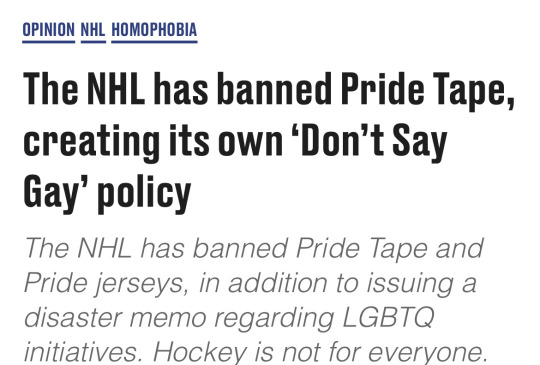

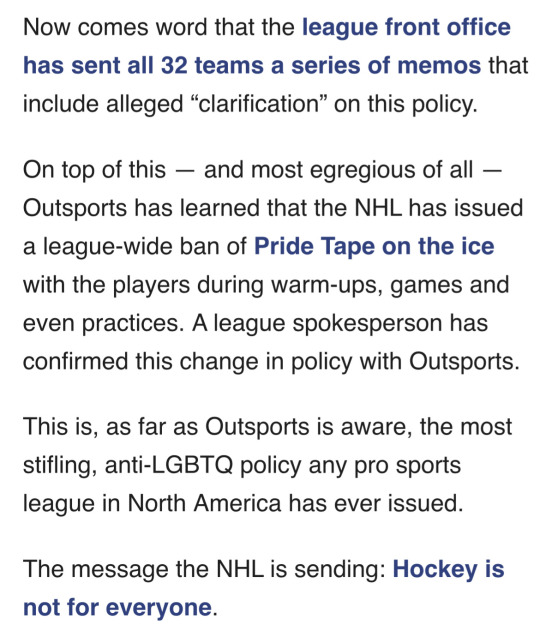
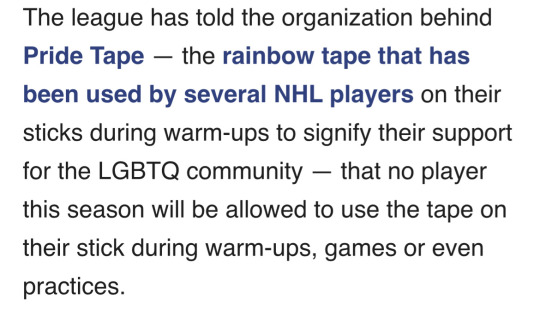
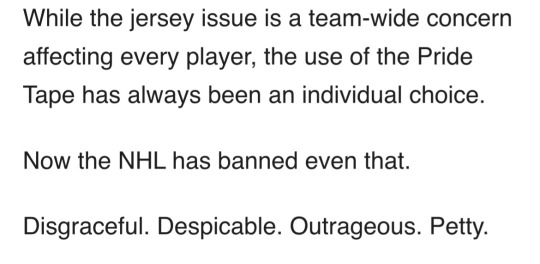
despicable
updates as of 22 oct
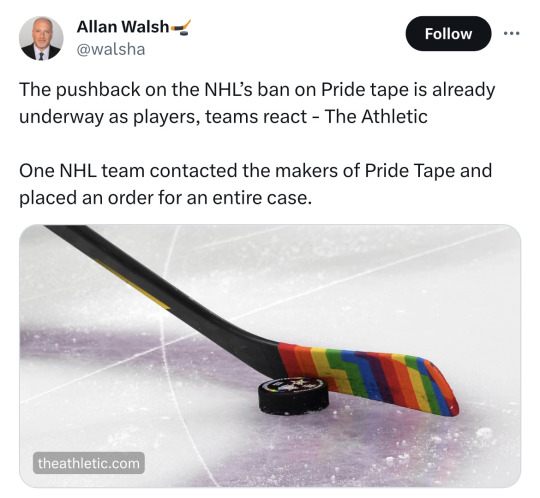
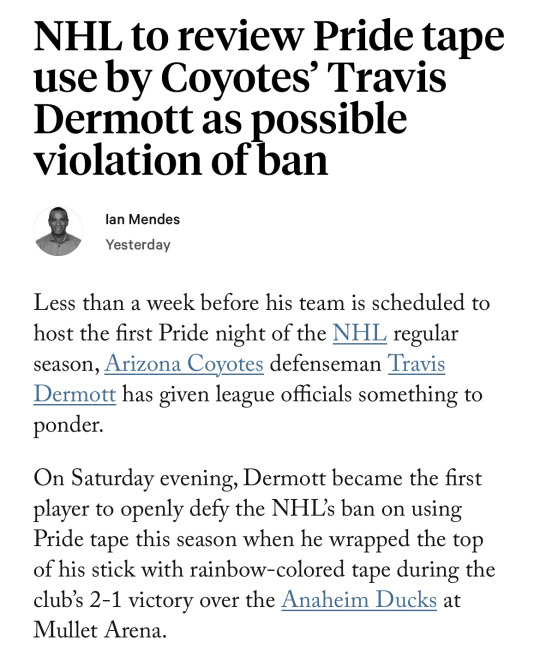
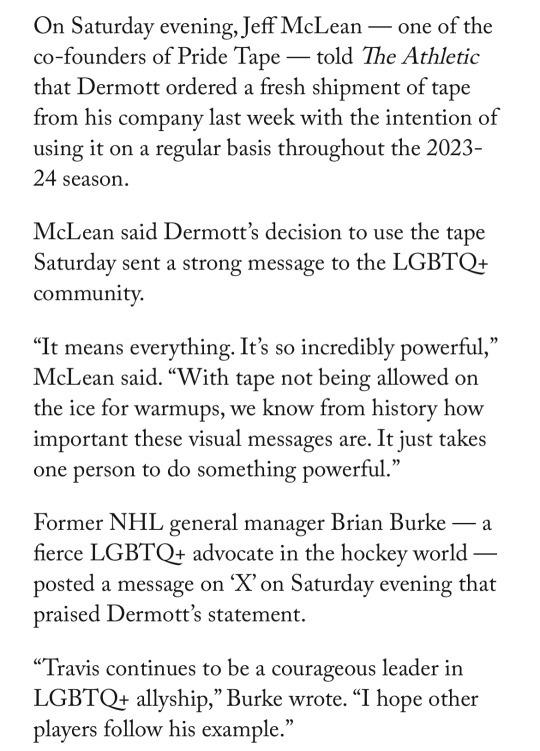
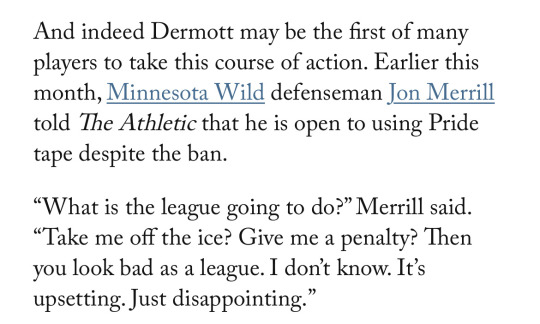
Travis Dermott knew that he would draw attention with his actions in the Coyotes’ home opener against the Anaheim Ducks at Mullett Arena on Saturday. The Arizona defenseman just hoped that the spotlight might shine on the issue that he was addressing, not on him.
“You don’t really want to go against rules that are put in place by your employer, but there’s some people who took some positive things from it,” Dermott said. “That’s kind of what I’m looking to impact.
“You want to have everyone feel included and that’s something that I have felt passionate about for a long time in my career. It’s not like I just just jumped on this train. It’s something that I’ve felt has been lacking in the hockey community for a while. I feel like we need supporters of a movement like this; to have everyone feel included and really to beat home the idea that hockey is for everyone.”
“I won’t lie,” said Dermott, who is playing on a one-year, two-way contract. “From the outside, it’s easy to see that I’m putting my career on the line for something. I definitely went through some emotional ups and downs that night, not regretting anything by any means, but I’d love to have maybe done a couple of steps a little different by making sure that everyone was aware of what was going on before I did it.
“I don’t want to put my teammates or my coaches or my GMs or the equipment managers in any kind of bad light when it’s their job to kind of look out for something like this happening. It was definitely something that I did just by myself and was prepared to kind of deal with whatever repercussions the league decides to push towards that. I’m not going to back off and say that this battle is won, but we’re going to find better ways to do it.”
As Dermott noted, LGBTQ+ inclusion is an issue that he has supported for a long time. Without getting into specifics, Dermott said the issue is personal for him because it impacts people close to him.
“I’d be lying if I said I haven’t shed tears about this on multiple occasions,” he said. “So yeah, it’s something I’m definitely very passionate about.
“I’ve met a lot of people that from the outside, it looks like they have everything going right in their life and they have a smile on their face every time they talk to you. But sometimes when we get closer to people and get comfortable enough for them to open up to you, you can see that there’s some pretty dark stuff happening to some good people. It doesn’t take too many times encountering something like that for it to really change someone.
“I’ve been blessed to have some of those opportunities put in front of me to really change my view of what being a good person means; what being a good father and a good example and role model means going forward. You really see how people are hurting and it’s because of a system that maybe no one’s intentionally trying to be malicious about, but until you’ve really had that first-person experience seeing people hurting from it right in front of you, it’s tough to kind of take steps.”
It would be a surprise if the league handed down any sort of punishment. The optics alone would add to the public relations damage that the original ban created. Even so, Dermott reiterated his desire to bring the entire franchise into the fold before he takes similar actions in the future, but he also made it clear that he will not be silenced on the topic.
“It’s not like I’m shutting up and going away,” he said. “I know more questions are going to be coming. We’re just going to be as prepared as we can be to just spread love. That’s the thing. It’s gay pride that we’re talking about, but it could be men’s health. It could be any war. It’s just wanting world peace. Everyone’s got to love each other a little bit more.
“Like my parents said growing up, ‘How awesome would it be to be the guy that people look up to?’ That’s what really hit home when I was a kid, especially from my mom. You want to grow up and be that guy. You want to be the guy that’s having the impact on kids like NHL players had on you. If they had been racist or bigoted, that’s going to have an effect on you.
“With how many eyes are on us, especially with the young kids coming up in the new generation, you want to put as much positive love into their brain as you can. You want them to see that it’s not just being taught or coming from maybe their parents at home. They need to see it in the public eye for it to really make an effect.”
34K notes
·
View notes
Text
“The bulging eyes and the twisted mouth” - Violence, Violent Imagery & Black Horror

TRIGGER WARNING: mentions of death, violence, blood, hate crimes, antiblackness, police violence, rape
Note! I am going to be speaking from a Black American point of view, as my identity informs my experience. That said, antiblackness itself is international. The idea of my Blackness as a threat, as a source of fear and violence to repress and to destroy, is something every Black person in the world that has ever dealt with white supremacy has experienced.
There are two things, I think, that are important to note as we start this conversation.
One: there is a long history of violence towards Black bodies that is due to our dehumanization. People do not care for the killing of a mouse in the way they care about a human. But if you think the people you are dealing with are not people, but animals- more particularly, pests, something distasteful- then you will be able to rationalize treating them as such.
Two: even though we live in a time period where that overt belief of Blackness as inhuman is less likely, we must recognize that there are centuries of belief behind this concept; centuries of arguments and actions that cement in our minds that a certain amount of violence towards Blackness is normal. That subconscious belief you may hold is steeped in centuries of effort to convince you of it without even questioning it. And because of this very real re-enforcement of desensitization, naturally another place this will manifest itself is in how we tell and comprehend stories.
There are also three points I'm about to make first- not the only three that can ever be made, but the ones that stand out the most to me when we talk about violence with Black characters:
One: Your Black readers may experience that scene you wrote differently than you meant anyone to, just because our history may change our perspective on what’s happening.
Two: The idea that Black characters and people deserve the pain they are experiencing.
Three: The disbelief or dismissal of the pain of Black characters and people.
You Better Start Believing In Ghost Stories- You’re In One
I don’t need to tell Black viewers scary fairytales of sadists, body snatchers and noncoincidental disappearances, cannibals, monsters appearing in the night, and dystopian, unjust systems that bury people alive- real life suffices! We recognize the symbolism because we’ve seen real demons.
Some real examples of familiar, terrifying stories that feel like drama, but are real experiences:
12 Years a Slave: “This is no fiction, no exaggeration. If I have failed in anything, it has been in presenting to the reader too prominently the bright side of the picture. I doubt not hundreds have been as unfortunate as myself; that hundreds of free citizens have been kidnapped and sold into slavery, and are at this moment wearing out their lives on plantations in Texas and Louisiana.” – Solomon Northup
When They See Us: I can’t get myself to watch When They See Us, because I learned about the actual trial of the Central Park Five- now the Exonerated Five- in my undergrad program. Five teen Black and brown boys, subjected to racist and cruel policing and vilification in the media- from Donald Trump calling for their deaths in the newspaper, to being imprisoned under what the Clintons deemed a generation of “superpredators” during a “tough on crime” administration. And as audacious as it is to say, as Solomon Northup explained, they were fortunate. The average Black person funneled into the prison system doesn’t get the opportunity to make it back out redeemed or exonerated, because the system is designed to capture and keep them there regardless of their innocence or guilt. Their lives are irreparably changed; they are forever trapped.
Jasper, Texas: Learning about the vicious, gruesome murder of James Byrd Jr, was horrific- and that was just the movie. No matter how “community comes together” everyone tells that story, the reality is that there are people who will beat you, drag you chained down a gravel road for three miles as your body shreds away until you are decapitated, and leave your mangled body in front of a Black church to send a message… Because you’re Black and they hate you. To date I am scared when I’m walking and I see trucks passing me, and don’t let them have the American or the Confederate flag on them. Even Ahmaud Arbery, all he was doing was jogging in his hometown, and white men from out of town decided he should be murdered for that.
Do you want to know what all of these men and boys, from 1841 to 2020, had in common? What they did to warrant what happened to them? Being outside while Black. Some might call it “wrong place wrong time”, but the reality is that there is no “right place”. Sonya Massey, Breonna Taylor- murdered inside their home. Where else can you be, if the danger has every right to barge inside? There is no “safe”.
It is already Frightening to live while Black- not because being Black is inherently frightening, but because our society has made it horrific to do so. But that leads into my next point:
“They Shouldn’t Have Resisted”
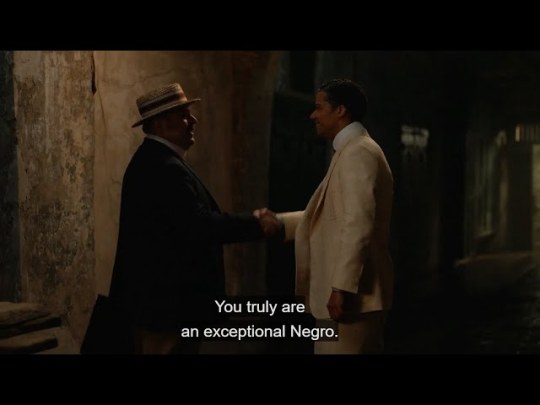
Think of all the videos of assaulted and murdered Black people from police violence. If you can stomach going into the comments- which I don’t, anymore- you’ll see this classic comment of hate in the thousands, twisting your stomach into knots:
“if they obeyed the officer, if they didn’t resist, this wouldn’t have happened”
Another way our punitive society normalizes itself is via the idea of respectability politics; the idea that “if you are Good, if you do what you are Supposed to do, you will not be hurt- I will not have to hurt you”. Therefore, if my people are always suffering violence, it must be because we are Bad. And in a society that is already less gracious to Black people, that is more likely to think we are less human, that we are innately bad and must earn the right to be exceptional… the use of excessive violence towards me must be the natural outcome. “If your people weren’t more likely to be criminals, there wouldn’t be the need to be suspicious of you”- that is the way our society has taught us to frame these interactions, placing the blame for our own victimization on us.
Sidebar: I would highly suggest reading The New Jim Crow, written in 2010 by Michelle Alexander, to see how this mentality helps tie into large scale criminalization and mass incarceration, and how the cycle is purposely perpetuated.
You have to constantly be aware of how you look, walk and talk- and even then, that won’t be enough to save you if the time comes. The turning point for me, personally, was the murder of Sandra Bland. If she could be educated, beautiful, a beacon of her community, be everything a “Good” Black person is supposed to be… and still be murdered via police violence, they can kill any of us. And that’s a very terrifying thought- that anything at any point can be the reason for your death, and it will be validated because someone thinks you shouldn’t have “been that way”. And that way has far less to do with what you did, than it does who you are. Being “that way” is Black.
My point is, if this belief is so normalized in real life about violence on Black bodies- that somehow, we must have done something to deserve this- what makes you think that this belief does not affect how you comprehend Black people suffering in stories?
Hippocratic Oath
Human experimentation? Vivisection? Organ stealing? Begging for medicine? Dramatically bleeding out? Not trusting just anyone to see that you are hurt, because they might take advantage? All very real fears. The idea that pain is normal for Black people is especially rampant in the healthcare field, where ideas like our melanin making our skin thick enough to feel less pain (no), an overblown fear of ‘drug misuse’, and believing we are overexaggerating our pain makes many Black people being unwilling to trust the healthcare system. And it comes down to this thought:
If you think that I feel less pain, you will allow me to suffer long before you believe that I am in pain.
I was psychologically spiraling I was in so much pain after my wisdom teeth removal, and my surgeon was more concerned about “addiction to the medication”. Only because Hot Chocolate’s mom is a nurse, did I get an effective medicine schedule. My mother ended up with jaw rot because her surgeon outright claimed that she didn’t believe that she was in more than the ‘healing’ pain after her wisdom teeth were removed. She also has a gigantic, macabre (and awesome fr) scar on her stomach from a c-section she received after four days of labor attempting to have me… all because she was too poor and too Black to afford better doctors who wouldn’t have dismissed her struggles to push.
As a major example of dismissed Black pain: let’s discuss the mortality rate of Black women during childbirth, as well as the likelihood of our children to die. When we say “they will let you bleed to death”, we mean it.
“Black women have the highest maternal mortality rate in the United States — 69.9 per 100,000 live births for 2021, almost three times the rate for white women, according to the Centers for Disease Control and Prevention. Black babies are more likely to die, and also far more likely to be born prematurely, setting the stage for health issues that could follow them through their lives.”
Even gynecology roots in dismissal (and taking brutal advantage of) Black women's pain:
“The history of this particular medical branch … it begins on a slave farm in Alabama,” Owens said. “The advancement of obstetrics and gynecology had such an intimate relationship with slavery, and was literally built on the wounds of Black women.” Reproductive surgeries that were experimental at the time, like cesarean sections, were commonly performed on enslaved Black women. Physicians like the once-heralded J. Marion Sims, an Alabama doctor many call the “father of gynecology,” performed torturous surgical experiments on enslaved Black women in the 1840s without anesthesia. And well after the abolition of slavery, hospitals performed unnecessary hysterectomies on Black women, and eugenics programs sterilized them.”
If you think Black characters are not in pain, or that they’re overexaggerating, you’re more likely to be okay with them suffering more in comparison to those whose pain you take more seriously- to those you believe.
What’s My Point?
My point is that whatever terrifying scene you think you’re writing, whatever violent whump scenario you think you’re about to put your Black characters through, there’s a chance it has probably happened and was treated as nonimportant (damn shame, right?) And when those terrifying scenes are both written and read, the way their suffering will be felt depends on how much you as a reader care, how much you believe they are suffering.
There’s a joke amongst readers of color that many dystopian tales are tales of “what happened if white people experienced things that the rest of us have already been put through?” Think concepts like alien invasion and mass eradication of the existing population- you may think of that as an action flick, meanwhile peoples globally have suffered colonization for centuries. The Handmaid’s Tale- forced birthing and raising of “someone else’s” children, always subject to sexual harassment by the Master while subject to hate from the Mistress- that’s just being a Mammy.
There’s nothing wrong with having Black characters be violent or deal with violence, especially in a story where every character is going through shit. That is not the problem! What I am trying to tell you, though, is to be aware that certain violent imagery is going to evoke familiarity in Black viewers. And if I as a Black viewer see my very real traumas treated as entertainment fodder- or worse, dismissed- by the narrative and other viewers, I will probably not want to consume that piece of media anymore. I will also question the intentions and the beliefs of the people who treat said traumas so callously. Now, if that’s not something you care about, that’s on you! But for people who do care, it is something we need to make sure we are catching before we do it.
“So I just can’t write anything?!”
Stop that. There are plenty of examples of stories containing horror and violence with Black characters. There’s an entire genre of us telling our own stories, using the same violence as symbolism. I’m not telling you “no” (least not always). I’m telling you to take some consideration when you write the things that you do. There’s nothing wrong about writing your Black characters being violent or experiencing violence. But there is a difference between making it narratively relevant, and thoughtlessly using them as a “spook”, a stereotypical scary Black person, or a punching bag, especially in a way that may invoke certain trauma.
The Black Guy Dies First
The joke is that we never survive these horror movies because we either wouldn’t be there to begin with, or because we would make better decisions and the narrative can’t have that. But the reality is just that a lot of writers find Black characters- Black people- expendable in comparison to their white counterparts, and it shows. More of a “here, damn” sort of character, not worth investment and easy to shrug off. The book itself I haven’t read, just because it’s pretty new, but I’m looking forward to doing so. But from the summaries, it goes into horror media history and how Black characters have fared in these stories, as well as how that connects to the society those characters were written in. I.e., a thorough version of this lesson.
Instead, I wrote an entire list of questions you could possibly ask yourself involving violence or villainy involving a Black character. Feel free to print it and put it on your wall where you write if you have to! I cannot stress enough that asking yourself questions like these are good both for your creation and just… being less antiblack in general when you consume media.
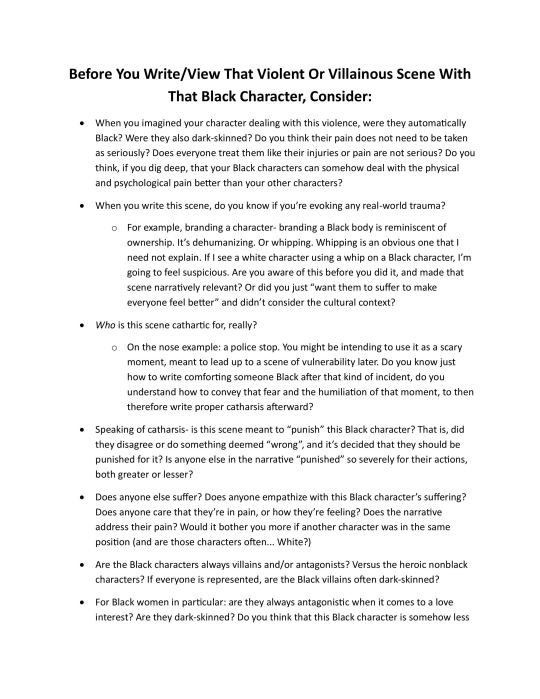
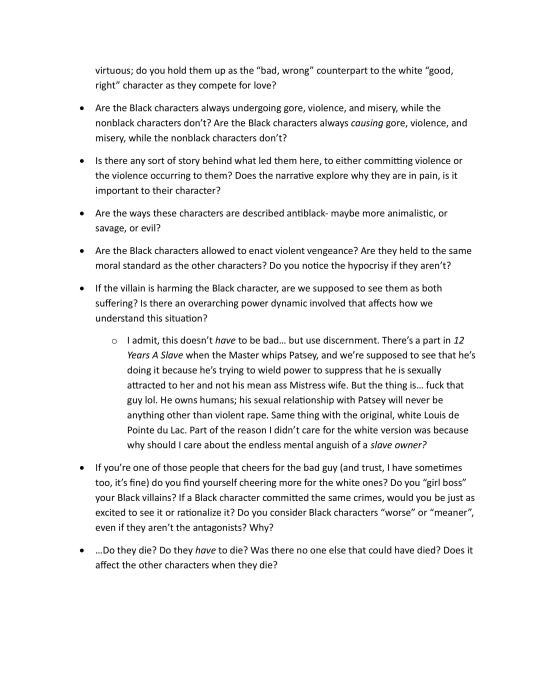
Black Horror/Black Thriller
We, too, have turned our violent experiences into stories. I continue to highly suggest watching our films and reading our stories to see how we convey our fear, our terror, our violence and our pain. There are plenty of stories that work- Get Out, The Angry Black Girl and her Monster, Candyman, Lovecraft Country (the show) and Nanny are some examples. There’s even a blog by the co-writer of The Black Guy Dies First who runs BlackHorrorMovies where he reviews horror movies from throughout the decades.
Desiree Evans has a great essay, We Need Black Horror More Than Ever, that gets into why this genre is so creative and effective, that I think says what I have to say better than I could.
“Even before Peele, Black horror had a rich literary lineage going back to the folklore of Africa and its Diaspora. Stories of haints, witches, curses, and magic of all kinds can be found in the folktales collected by author and anthropologist Zora Neale Hurston and in the folktales retold by acclaimed children’s book author Virginia Hamilton. One of my earliest childhood literary memories is being entranced by Hamilton’s The House of Dies Drear and Patricia McKissack’s children’s book classic The Dark-Thirty: Southern Tales of the Supernatural, both examples of the ways Black authors have tapped into Black history along with our rich ghostlore.” “Black horror can be clever and subversive, allowing Black writers to move against racist tropes, to reconfigure who stands at the center of a story, and to shift the focus from the dominant narrative to that which is hidden, submerged. To ask: what happens when the group that was Othered, gets to tell their side of the story?”

For on the nose simplicity, I’m going to use hood classic Tales From The Hood (1994) as an example of how violence can be integrated into Black horror tales. Tales From The Hood is like… The Twilight Zone by Black people. Messages discussing issues in our community, done through a mystical twist. Free on Tubi! If you want to stop here before some spoilers, it’s an hour and a half. A great time!
In the first story, a Black political activist is murdered by the cops. The scene is reflective of the real-world efforts to discredit and even murder activists speaking out against police violence, as well as the types of things done to criminalize Black citizens for capture. The song Strange Fruit plays in the background, to drive the point home that this is a lynching.
The second story deals with a Black little boy experiencing abuse in the home, drawing a green monster to show his teacher why he’s covered in wounds and is lashing out at school.
The fourth story is about a gangbanger who undergoes “behavioral modification” to be released from prison early. Think of the classic scene from A Clockwork Orange. He must watch as imagery of the Klan and of happy whites lynching Black bodies (real-life pictures and video, mind you!) play into his mind alongside gang violence.
Isn’t Violence Stereotypical or antiblack?

That last story from Tales From The Hood leads into a good point. It can be! But it does not have to be! Violence is a human experience. By suggesting we don’t experience it or commit it, you would be denying everything I’ve just spoken about. We don’t have to be racist to write our Black characters in violent situations. We also don’t have to comprehend those situations through a racist lens.
Even experiences that seem “stereotypical” do not have to be comprehended that way. I get a LOT of questions about if something is stereotypical, and my response is always that it depends on the writing!!! You could give me a harmless prompt and it becomes the most racist story ever once you leave my inbox. But you could give me a “stereotypical” prompt and it be genuine writing.
Let’s take the movie Juice for example. Juice in my honest to God opinion becomes a thriller about halfway in. On its surface, Juice looks like bad Black boys shooting and cursing and doing things they aren’t supposed to be doing! Incredibly stereotypical- violent young thugs. You might think, “you shouldn’t write something like this- you’re telling everyone this is what your community is like”. First- there’s that respectability politics again! Just because something is not a “respectable” story does not mean it doesn’t need to be told!
But if we’re actually paying attention, what we’re looking at is four young boys dealing with their environment in different ways. All four of them originally stick together to feel power amongst their brotherhood as they all act tough and discover their own identities. They are not perfect, but they are still kids. In this environment, to be tough, to be strong, you do the things that they are doing. You run from cops, you steal from stores, you mess with all the girls and talk shit and wave weapons. That’s what makes you “big”. That’s what gives you the “juice”- and the “juice” can make you untouchable.
I want to focus particularly on Bishop, yes, played by Tupac. Bishop, the antagonist of Juice, is particularly powerless, angry, and scared of the world around him. He puts on a big front of bravado, yelling, cursing, and talking big because he’s tired of being afraid, and he doesn’t know how to deal with it otherwise. So when he gets access to a gun- to power- he quickly spirals out of control. His response to his fear is to wave around a tool that makes him feel stronger, that stops the things that scare him from scaring him.
Now, that is not a unique tale! That is a tale that any race could write about, particularly young white men with gun violence! If you ever cared for Fairuza Balk’s character in The Craft, it is a similar fall from grace. But because it is on a young, Black man in the hood, audiences are less likely to empathize with Bishop. And granted, Bishop is unhinged! But many a white character has been, and is not shoved into a stereotype that white people cannot escape from!
Now would I be comfortable if a nonblack person attempted to write a narrative like Juice? Yes, because I’d worry about the tendency to lose the messaging and just fall into stereotype outright. But it can be done! The story can be told!
“But if Black violence bad, why rap?”
The short answer:
“In order for me to write poetry that isn’t political, I must listen to the birds, and in order to hear the birds, the warplanes must be silent.”
Marwhan Makhoul, Palestinian Poet
First, rap is not “only violence and misogyny”. Step your understanding of the genre up; there are plenty of options outside of the mainstream that don’t discuss those things. Second, every genre of music has mainstream popular songs about vice and sin. The idea that Black rappers have to be held to a higher standard is yet another example of how we are seen as inherently bad and must prove ourselves good. We could speak about nothing but drugs and alcohol and 1) there would still be white artists who do the very same and 2) we would still deserve to be treated like humans.
That said, many- not all- rappers rap about violence for the same reason Billy Joel wrote We Didn’t Start the Fire, the same reason Homer first spoke The Iliad- because they have something to say about it! They stand in a long tradition of people using poetry and rhythm to tell stories. Rap is an art of storytelling!
Rap is often used as an expression of frustration and righteous anger against a system built to keep us trapped within it. I’m not allowed to be angry? Why wouldn’t I be angry? Anger is a protective emotion, often when one feels helpless. Young Black people also began to reclaim and glorify the violence they lived in within their music, to take pride in their survival and in their success in a world that otherwise wanted them to fail. If I think the world fights against me no matter what I do, I’d rather live in pride than in shame with a bent head. Is it right? Maybe, maybe not. But if you don’t want them to rap about violence, why not alleviate the things leading to the violence in their environment?
Whether you choose to listen to their words, because the delivery scares you- and trust, angry Black men scared the music industry and society- doesn’t make the story any less valid!
Conclusion
I am going to drop a classic by Slick Rick called Children’s Story. I think listening to it- and I mean genuinely listening- summarizes what I’ve said here about how Black creators can tell stories, even violent ones, and how even the delivery through Blackness can change how you perceive them. Please take the time to listen before continuing.
youtube
I’ve been alive for 28 years and have known this song my whole life, and it just hit me tonight: not once is the kid in this story identified as Black! My perception of this story was completely altered by my own experiences, who told the story, and how it was told.
That’s what I’m trying to tell you. You can tell stories of violence that involve Black characters. I love and adore a good hurt/comfort myself! But you need to be cognizant of your audience and how they’ll perceive the story you’re telling, and that includes the types of imagery you include. It’s not effective catharsis via hurt/comfort for the audience if your Black readers are being completely left out of the comfort. “I wrote this for myself” that’s cool, but… if you wrote racism for yourself, and you’re willing to admit that to yourself, that’s on you. I’d like to think that’s not your intention! You can write these stories of woe and pain without mistreating your Black characters- but that requires knowing and acknowledging when and how you’re doing that!
@afropiscesism makes a solid point in this post: our horror stories are not just fairytales full of amorphous boogiemen meant to teach lessons. Racial violence is very real, very alive, and we cannot act like the things we write can be dismissed outright as “oh well it’s not real”. Sure, those characters aren’t real. But the way you feel about Black bodies and violence is, and often it can slip into your writing as a pattern without you even realizing it. Be willing to get uncomfortable and check yourself on this as you write, as well as noticing it in other works!
If you’re constantly thinking “I would never do this”, you’ll never stop yourself when you inevitably do! If you know what violent imagery can be evoked, you can utilize it or avoid it altogether- but only if you’re willing to get honest about it. You might not intend to do any of this, but it doesn’t matter if you don’t change the pattern, because as always, it’s the thought that counts, but the action that delivers!
#creatingblackcharacters#long post#writing#writing black characters#black character design#black history#media history
742 notes
·
View notes
Note
one problem with a theatrical adaption of tlt is htn, where the reveal that Gideon lives on works because of the change of second person to first.
the only way i can think of it working is that the actor playing gideon works backstage, like the lights system (but is hidden from the audience aside from subtle hints)
the biggest hint is when when wake breaches pal's river bubble she 'breaks' the lighting system and the stage goes dark. harrow is ushered into the wings by pal so she doesn't see anything, but the lights flick back on just before the curtains drop for a scene change, and pal looks directly up at the light box in surprise and smiles. if the audience is quick to turn around they can see a flash of a black robe.
Oh boy my friend, have you come to the right place!!
So, fun fact about ninja. Bear with me, I am going somewhere with this. The image of a ninja covered head to toe in black, with a hood and mask, comes from Kabuki theatre. It was originally a stagehand uniform. Like stagehands in modern theatre, stagehands in Kabuki would wear all black to signify that they were not really there, and whatever effect they were causing (carrying a prop, creating a breeze, ect.) was to be taken as happening on its own. Basic stagehand stuff, a lot of productions in many styles around the world do it, especially if they don't have fancy rigging systems.
Someone (I don't remember who now, or in what play) had the idea to dress the ninja in a production up as a stagehand. In the convention of the theatre, this made them invisible. The audience was already so used to ignoring stagehands, they didn't know any more than the characters that the ninja was present, despite the actor being clearly visible on stage. Which meant when the ninja struck, it was as if out of nowhere. I can only imagine the uproar in the theatre the first time it happened. It worked so well as to become commonplace, and the rest is history. The popular image of a ninja is still a kabuki stagehand.
So, back to the stage play of Harrow the Ninth. I think you've hit almost exactly on how to incorporate the Gideon twist into a theatrical production. But not as a lighting tech. Gideon is a stage hand. Maybe there would be more than one stagehand, maybe she would be the only one, but she would operate in full view of the audience, literally setting the scenes. I think it works best if she's the only one, but if the production needs more, she should subtly stand out in some way. As the play went on, we would notice that this one stage hand... increasingly interacts with Harrow, though Harrow never acknowledges it. At first it might look like she's playing Harrow's necromancy, because that would be the main special effect she would need to help with. When Harrow is unconscious at the end of a scene, it's always the same stagehand carrying her out. But we all know she's not really there. Until Palamedes acknowledges her. Turns to look right at her, and speaks to her. I can see the scene clearly. He would look at her, stunned, until Gideon finally took off her mask. The line "Kill us twice, shame on God," would be addressed to Gideon, and then he would turn back to Harrow, kiss her on the forehead, and tell her to go. Gideon, always out of Harrow's line of sight, would guide Harrow away while Harrow looked back at Palamedes.
#the locked tomb#harrow the ninth#I have a few ideas how to do gideon as harrow but it needs a lot of workshopping#I love this idea#htn spoilers#gideon nav#speaking as someone who has worked as a light tech that specifically doesn't work so well#because techs are rarely on stage messing with the lights during a production#maybe if there was a spot on the catwalk or if the array was small and the gels needed changing#but anyone who can turn off all the lights on stage is usually behind the audience in a little control room with a lot of switches and dial#that said the stage SHOULD go completely dark immediately after this scene#and the lights should come up suddenly on Gideon and Harrow alone on stage together#harrow having a crisis and staring resolutely forward while Gideon behind her reaches for her and can't touch her#just for a brief moment
658 notes
·
View notes
Text
Armand and Unbreakable Cycles
So (perhaps unsurprisingly at this point) I have a TON of Armand thoughts after yesterday’s episode. Specifically I want to talk about the function of the 1790s section, and how it perfectly illuminates the cycle of maladaptive behavior that Armand is caught up in and the difference between his stated wants and his actual needs. I think the setup we saw in this episode will also be crucial to understanding how Dubai plays out, so I want to talk about that too.
I know a lot of people love the show and TVC because of Lestat, and there’s some frustration that Lestat was presented in a way that was untrue or filtered. But I really think you have to view this episode as a lens into Armand, which we in turn need in order to understand Louis. Everyone has someone similar to Lestat’s role in Armand’s life; an ex or a situationship or a former friend who takes up so much real estate in your brain because of their outsized impact on you, who probably never thinks of you in return. We give these people a role in the story we craft of how we became who we are. That narrativizing is kind of the only way to understand yourself and survive (especially if you’re going to live forever). So I don’t doubt that there are things that Armand says that are untrue, or exaggerated, or twisted in his favor. But I do think the important part is the emotional impact his encounter with Lestat had on him, and I do think he’s being honest about those emotions.
(That being said I am of course very excited to see these events play out again in season 3 from Lestat’s POV. Don’t fuck it up AMC!!!)
The main thing that the flashback does is set up the cycle that Armand finds himself in over and over again. He consistently finds himself clinging to control in an institution he is starting to lose faith in, and is then shaken out of his complacency by a new love that seems– falsely– to rescue him.
Depending on how they adapt his very early backstory, I think we can probably assume that this pattern started in childhood for him. Marius rescued him from being forced into sex work, and seemed to offer a much better life. But in reality he was just grooming Armand. (Thanks @toriangeli for correcting a piece of my Marius lore here!)
In Paris he continues maintaining a strictly enforced life of misery for the coven long after he stops believing in it himself, and (by his telling at least) he was grateful to Lestat for having the strength to end it when he could not. It’s so clear why Armand falls for Lestat. Lestat’s refusal to live in shame, his love of the arts, his ability to exist amongst humanity (at least when he is on stage). Lestat is of the world, while Armand and the coven hide from it.
The reason I think it is so important that we got to see this play out in Paris is the way it illuminates the sometimes tricky relationship between Louis and Armand. Once again, Armand is the head of an institution that operates on strict and oppressive rules. Once again, we can feel Armand’s enthusiasm for this system waning (and see it reflected physically in the lack of ticket sales and general shabbiness of the theatre). And once again, Armand is swept off his feet by this new vampire who refuses to join, who loves humanity, and who has a passion for art. Louis is very much of the world. He refuses to be pinned down into coven life. Armand can’t resist taking what looks like the opportunity for escape in Louis’s love.
What I think is so fascinating about this cycle is that it allows Armand to remain passive. He never has to be the one to make the hard call to walk away from a kind of life that is no longer serving him. He just has to wait for the next gorgeous man to arrive to deliver him. As he says to Louis, “those with the most power are often the weakest”. His status and power in the coven prevents him from changing his own life. Or at least that’s what he believes.
Thinking about this helped me understand the dynamic of what goes down in the sewers, when Armand threatens Louis’s life. Assad says in the behind the scenes clips that Armand goes into that encounter very set on killing Louis, and I believe him. So I rewatched it a couple of times trying to understand when, and why, Armand changes his mind. The shift occurs when they start talking about Claudia, and Armand says that her mind will break apart soon because she was made too young. Louis says “you don’t know her,” and Armand responds, “I don’t have to. I’ve seen it before. I’ve seen too much.” That admission– I’ve lived through this cycle multiple times before, it is painful, and I don’t want to do it again– is what shifts Armand from being ready to kill Louis to letting him go.
There is of course an irony here; mentally ill and child vampires do not necessarily need to go mad. Generally they go mad at least partially because of Armand’s actions. And as we’ve already discussed, Armand going to sleep with Louis instead of killing him is really just a repeat of his actions with Lestat. He isn’t really breaking a cycle at all. But I think in that moment he believes that he is. Maybe he even believes that by being with a man who enacted great violence on Lestat, he can drown out the love and anguish he still feels about Lestat. At the very least, Louis has also loved Lestat and can therefore understand Armand’s narration of his own life in a way that not many other people can.
Ok, so now we are caught up on the past. Let’s talk about Dubai, and how once again Armand is engaged in the exact same cycle of behavior.
The penthouse is Armand’s new coven. He maintains perfect order by controlling the physical environment and shaping Louis’s moods and memories. But just like before, this way of life is no longer serving Armand (or Louis for that matter). You can see that the spark between them has died, only rekindled as a kind of performance when they are in front of Daniel. When Armand is telling Daniel about Lestat destroying the coven, and Daniel accuses Armand of leading Lestat to the coven intentionally… he might as well be talking about himself. Armand has let Daniel into his fortress, and there is at least a part of him that wants whatever destruction Daniel is about to bring into his life.
Daniel fits Armand’s type completely. Daniel is of course more human than Lestat or Louis could ever be. He knows about telenovelas and Bollywood and all other types of art. He’s whipsmart and inquisitive and is not going to let Armand get away with passively maintaining his old order. He’s of the world in a way that Armand finds irresistible.
I specifically found it interesting how many of the “Great Laws” Armand would be breaking by being with Daniel. Granted, Armand isn’t in the coven anymore when he meets Daniel. But I imagine old habits are hard to break, and being with Daniel would break almost all of them. Daniel is a mortal Armand has revealed his true nature to and allowed to live, Daniel has written about and exposed vampire secrets, and (if we’re looking at book canon) Daniel begs for the dark gift himself, a thing only the maitre is supposed to be able to approve.
Assuming that a chunk of Devil’s Minion did happen in the 1970s, something interrupted that love affair, before it could settle back down into a new but still oppressive status quo. Something prompted Armand to actively break his pattern of behavior and erase Daniel’s memories. I think it’s impossible not to think about Nicki’s example here, especially after seeing the 1790s flashback. I’m going to assume that 1970s Daniel was struggling with addiction and mental health issues in a way that may have been reminiscent of Nicki. How intentional was Armand in withdrawing because he saw what vampire involvement- his involvement- did to Nicki? How much was his treatment of Daniel a reparation for past mistakes he made?
These last couple of paragraphs are speculation, really, because we won’t know exactly what Armandaniel looked like until Ep 5. But I think it was crucial that we saw this part of Armand’s story before we see San Francisco, because his actions with Daniel will make more sense if we can compare them with the love affairs of Armand’s past.
Regardless, I do think the disparity between what Armand claims to want (maintaining the status quo) vs what he actually wants (to be liberated by a romantic partner) vs what I think he actually needs (to take action himself, instead of waiting for someone to do it for him) is going to play a role in the way Dubai unfolds. I don’t know that Armand will ever get to the point where he’s actively able to break out of the cycle he’s in, because this is Interview with the Vampire, the show of fucked up gothic romances. Vampire life is a series of bad decisions! It’s a weird arrested development you never quite get out of despite living for forever! So it would make total sense if the ending of Dubai mimics the ending of the Children of Satan and the Paris Coven in an unhealthy way. But regardless, it’s gonna be a fun ride, and I can’t wait to see it.
#interview with the vampire#iwtv#my meta#Armand#Daniel#Lestat#lesmand#armandaniel#devil's minion#Louis#loumand
343 notes
·
View notes
Text
Scorpio Through The Houses: Part 2
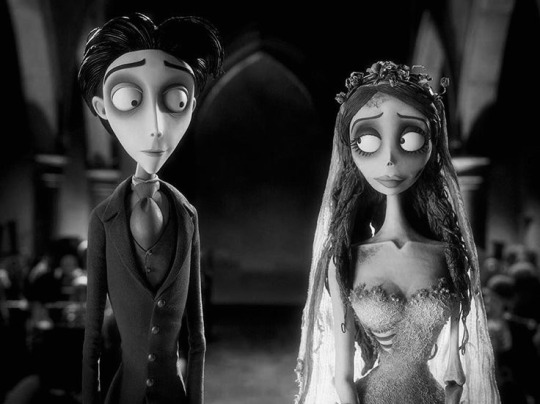
Scorpio 7th house: You are married to death. This is the literal embodiment of corpse bride. You love relationship connections with people that transform you. There’s a deep need to want a partner that feels secure and powerful enough to defend you. While others may fear your partner, you find a deep sense of safety around them. There’s definitely an air of mystery surrounding your love life and relationships. People think you are closed off when it comes to speaking about your love life and you like to keep it that way. However, there may be a tendency to be very possessive and protective of your partner. Likewise you may want a partner that is obsessive over you. While this can be seen as negative, the truth is you just desire someone that you can share the chaos in your life with. You want your relationships secure because you want to feel like you can fully express the deepest parts of your emotions and share your secrets. A desire to be consumed by your connections with other people and be transformed to a whole new being. You want to be changed through the relationships you have. Other people may fear you because you can be seen as someone who is very picky about who you hang around. The truth is you value loyalty, so you’re very skeptical about who you want to lean on.

Scorpio 8th house: This one was a little hard for me to describe as the themes of the 8th house and Scorpio somewhat merge into one another. However, what separates Scorpio in the 8th versus other houses is that these individuals will strive for death. There is an innate understanding of the cycles of death and rebirth. They charge fearlessly into danger and deadly situations in order to become renewed. It’s probably because they have inherited a lot of trauma and dealing with difficult challenges growing up. Once they get down to uncovering the shadows that have plagued their past, they become very skilled at dealing with things that others are scared of. Unafraid at diving head first into the void and coming out transformed. Reckless behavior can be an issue though because of the idea that you’ve dealt with death before so you can do it again. Other people fear your ability to still remain unscathed and brave even through the darkest times. Scorpio here is really a reservoir of personal power and endurance. It’s a placement of building tough skin to deal with the pains of life.
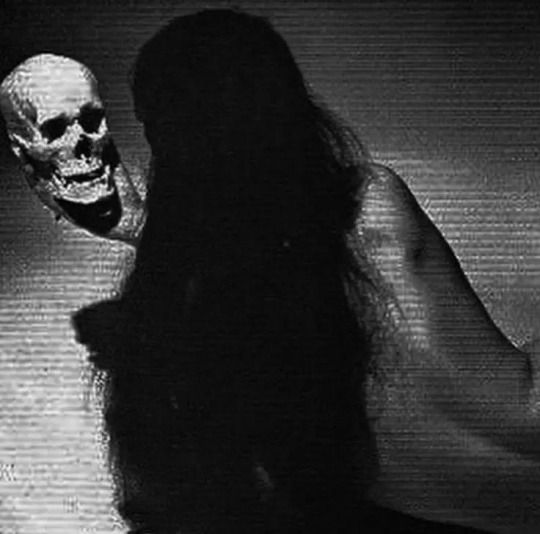
Scorpio 9th house: Death is seen as something worthy to be revered. Scorpio on the 9th depicts how you deal with themes of faith and belief. These individuals believe that death is a part of life that we all must go through. Death is seen through a philosophical lens for them. Whatever belief system they have can help cope with the inevitability of death. They pursue and try to learn more about the darker themes of life. Higher education and travel are very important for you, as it transforms your understanding about the world around you. These are the people that come back after a trip and are a completely different human being. A deep desire to understand the pain and emotional complexities of humanity in a wider lens. This might lead you to pursuing psychology, diving into the occult and learning about things considered taboo. Some will fear your beliefs and the amount of knowledge you may have. Knowledge especially about things that aren’t usually spoken about. Others will think you are psychic for being able to point out the shadows in their own lives. Many will rally behind your beliefs and support as they believe you have valuable information to offer. The issue is when you manipulate the information you know and using knowledge for your own personal benefit.

Scorpio 10th house: Scorpio here shows that you meet death within the public eye. The way you have changed and grown over the years is put on full display for others to see. They are oftentimes viewed as someone who is deadly and can face a lot of demonizing scrutiny. I’ve noticed a lot of people can be obsessed with the transformations these people have made. You will probably have to deal with authority figures being threatened by you. Tendency to be called a liar and receive hate for not being the same person others believed you to be. When it comes to your career, you may face a workplace where your coworkers and bosses are afraid of you. So you will have to deal with these people alienating and trying to diminish you. The reason being is because they see the amount of potential you have. There is an innate ability to become someone that transforms the way things are done. Being able to change how the industry you are in functions and having radical ideas to push things further. The public view of you can be filled with people that are obsessed and protective over your business accomplishments. As well as, people that will try to not give you credit for all the hard work you have done. Whatever field of career you choose can involve you looking into the darker themes of that field.
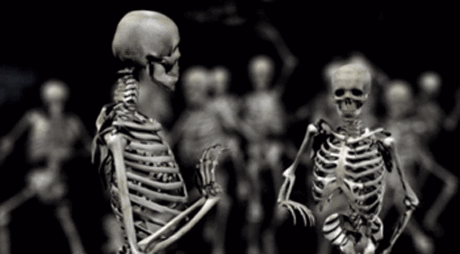
Scorpio 11th house: Death is your best friend with Scorpio in the 11th. You have dealt with constant changes and challenges when it comes to your network of friends. A lot of your friend groups have significantly shifted over time. There is a tendency to keep company with people that have faced significant hardships in their lives. It’s because you like to make friends with people that will transform you. You learn a lot from them and become anew through them. Stagnant friendships and connections don’t sit right with you. There has to be an evolution involved in order to be your friend. This might make you secretive about the people you hang around. That’s cause others may view your friends as intimidating and scary. You personally have built deep emotional bonds with your friends that others can’t see. So you become protective and hide your friendships from facing scrutiny. Some of your friends though, can be shady people. You may have dealt with a lot of backstabbing in the past so you are very picky on who you like to keep company. A negative aspect of this would be not trusting the people in your community. Feeling like you don’t need friends or anyone to support your needs. This lack of trust can cause you to even become slightly manipulative and controlling over your friends. So be careful and remember that you will find friends that demonstrate loyalty.
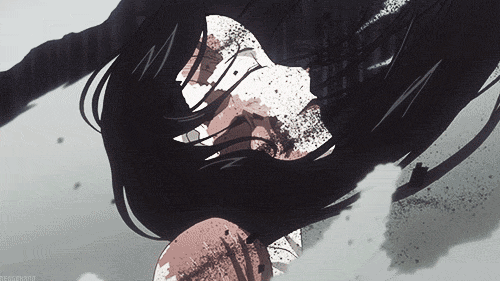
Scorpio 12th house: In the 12th house, Scorpio symbolizes meeting death when you are alone. These people face death on their own. The constant internal battles and transformation they face are kept hidden behind the scenes. These are the type of people to have a fun and optimistic exterior, but once alone can become pessimistic. The reason being is when you are alone, that is when you can see your own shadow. All the deepest parts of yourself, traumatic events and wounds are brought up to the surface. It can be terrifying to some as it is parts of your psyche that has been kept hidden away. You can sometimes have random flashbacks of events that have been painful to you that you believed you outgrew. The issue lies when these people are afraid of being by themselves. Don’t be afraid as this is a great source of your power. You gain a lot of insight and knowledge when you are alone. Isolation is extremely transformative in order to help you become a better version of yourself. Treat your alone time with a lot of love and care. Learning to be a nurturing figure when no one is around is key for your self development. This is why others may fear your ability to withstand being by yourself and still retaining your personal power.

The End
#scorpio astrology#Scorpio through the houses#scorpio moodboard#scorpio sun#scorpio#astro community#astrology#astrology observations#astro notes#scorpio moon
702 notes
·
View notes
Text
Holy forking shirtballs
I'm choosing violence today. I started this on Twitter, but I'm going to finish my thoughts here like I always do.
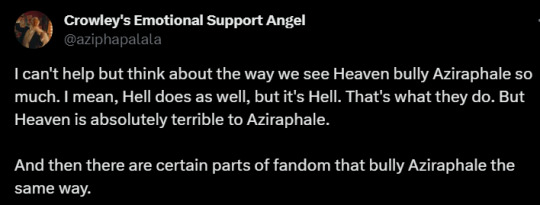
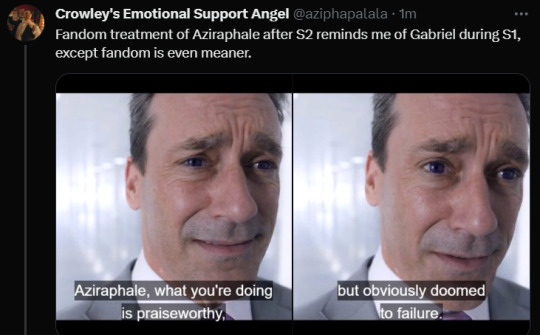
But what really blows my mind the most is the way that people look at Aziraphale's "choice" at the end, as if he had one to fucking begin with.
I'm sorry, but Aziraphale knows how messed up Heaven is. He told The Metatron, more than once, that he did not want to go back to Heaven! We can debate what each of us means by "choice" all night because my "choice" and your "choice" might be two different concepts. He could have been strong armed by The Metatron or he could have looked at where things were headed and realized he had no choice but to intervene himself.

You need to ask yourself what Aziraphale has a moral imperative to do.
What do we owe to each other?
Seriously, if you have not watched The Good Place, I recommend you go and watch it, because it absolutely shaped how I've viewed Good Omens 2 since its release.
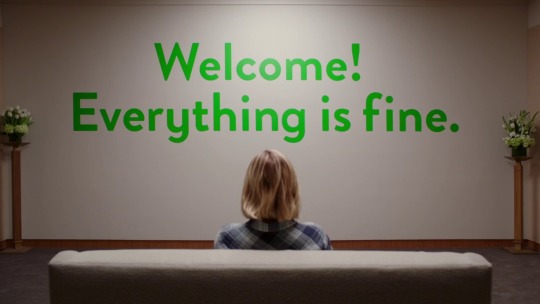
My levels of frustration with the bad faith mischaracterizations of Aziraphale are off the charts. If you are blaming him for everything, implying that he should have to grovel and that Crowley has a right to hurt him back, you have missed the point of Good Omens entirely.
I defend Aziraphale, but I don't think one of them is more right or wrong than the other. They're equals. They're a group of the two of them, acting and reacting to each other throughout history. They're Alpha Centauri.

I cannot even begin to explain how fucking devastated I felt when Crowley said these words, knowing he was fighting a losing battle. What he said took a lot of courage because he's finally admitting something they've both been too scared to publicly define for 6,000 years. Crowley has had to spend so long with a rough outer shell because he fell and had to hide all of his softness.
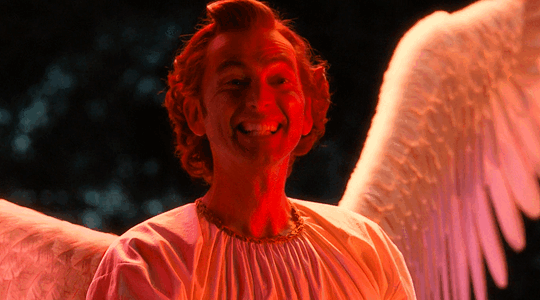
The look on his face was one of pure joy when he created that nebula, but I think the fact that he got to share that moment with Aziraphale is what has always stuck with him.
So yeah, seeing Crowley with a broken heart at the end of "Every Day" was sad for me as well.

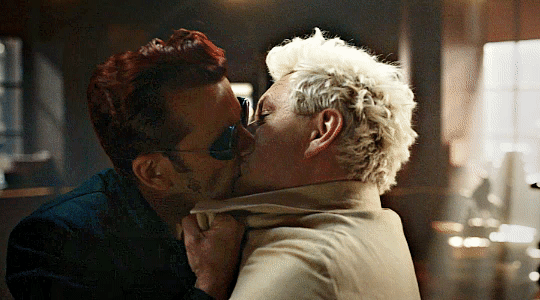
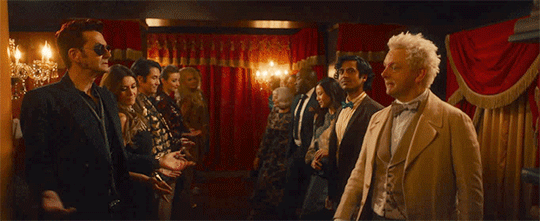
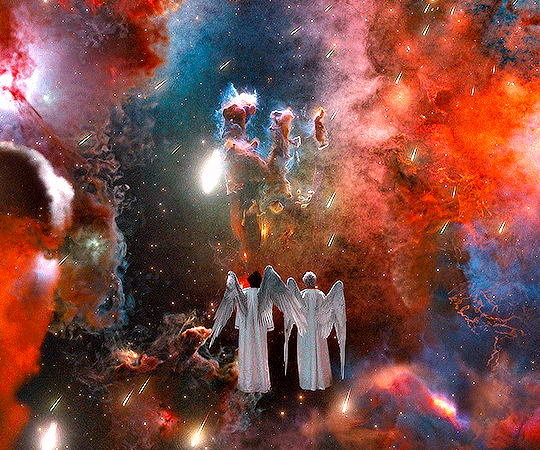
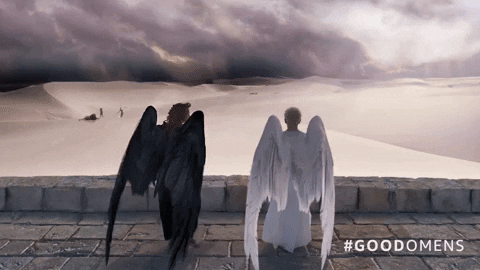



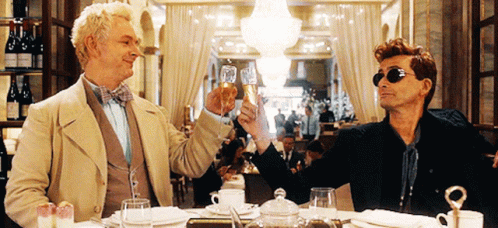
My brain still lives here!!
But Neil has said that Good Omens 3 is not quiet, gentle, or romantic. I imagine it's going to be more like the the first season in which they are not central to the plot. GO2 will help us make sense of how they ended up where they are when we see the bigger picture with all the other major players involved with GO3.
Aziraphale was still a soldier and accidentally got himself discorporated in his own magic circle in season one. He had a platoon waiting on him to start Armageddon, and he deserted them to go save the world with Crowley instead. Aziraphale is a deserter. I need everyone to remember that. He yeeted himself out of Heaven and sought out Crowley before even locating a body just to warn him about what was happening so they could try to save the world together.

I can't help but think of 1941 and that magician who had been arrested for being a deserter.
Aziraphale disobeyed orders. That took courage but it branded him as a traitor against Heaven. They tried to destroy him for it the same way Hell tried to destroy Crowley for his part in stopping the war.
Aziraphale and Job are the only characters we have seen interacting with God directly. Aziraphale has spoken to God before and he is determined to do so again.
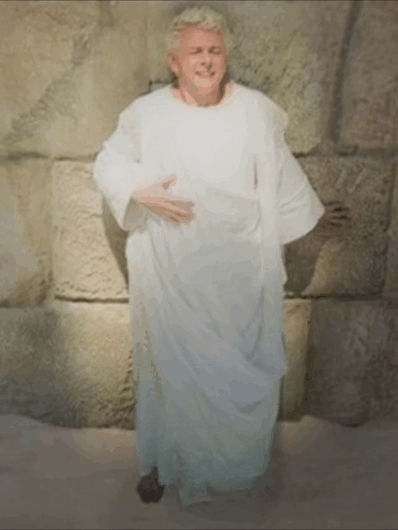
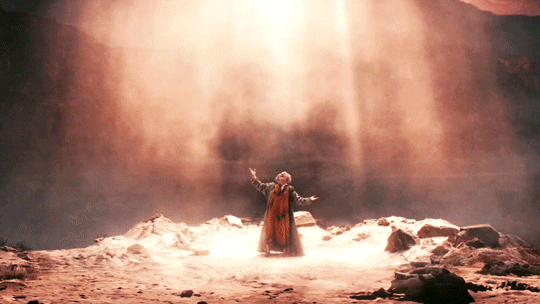
Aziraphale knows Heaven is flawed, but he also knows it's supposed to be good. He wants it to be good. He does not like the way the system works and he wants to make a difference. (And I'm pretty sure he's also determined to talk to God without being intercepted by The Metatron.)
Since when is that a bad thing? I don't get it. And I've had this discussion before.
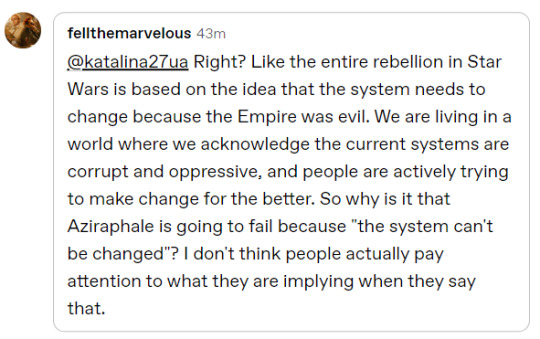
If you need to change the system by burning the old one to the ground, it's still change, and we don't know what Aziraphale has planned.
It seems to me that people just want to see Aziraphale fail because it would punish him for returning to Heaven instead of running off with Crowley.
Some of y'all take everything Aziraphale says or does and twist those things into malicious anti-Crowley actions because you think the only reason Aziraphale exists is to make Crowley happy, and if he isn't thinking only about Crowley then he's doing something wrong.
Aziraphale does not exist as a plot device to further Crowley's character. They come as a pair. They've been learning from each other for 6,000 years. Crowley challenges Aziraphale just as much as Aziraphale challenges him.
You can be mad at Aziraphale all you want, but villainizing him is gross. Defending Crowley does not mean you have to tear down and mischaracterize Aziraphale anymore than defending Aziraphale means you have to tear down Crowley (but I don't see that happen on nearly the same level it happens to Aziraphale). Stop painting Aziraphale as an abusive partner, for fuck sake.
Aziraphale knows there are flaws in the system. He wants to make a difference, and since he has seen that Gabriel can change, then maybe the whole system can. He has to at least try, and if he can succeed then maybe he and Crowley can stop hiding and finally be together without having to look over their shoulders all the time.
Why is that a bad thing? He's just as protective of Crowley as Crowley is of him!

But don't forget that Aziraphale's wing was covering Adam and Eve too. As much as a wants to protect Crowley, he has a moral imperative to keep humanity safe as well.
He sent Adam and Eve into the unknown with a flaming sword so they could protect themselves.
As much as he wants to be with Crowley, there are 8 billion people on Earth heading toward the Second Coming and Judgment Day. They'll work together to fight alongside humanity in the end. Aziraphale should not have to humiliate himself just to earn Crowley's forgiveness. That's a rancid notion.
The Resurrectionist was a whole ass moral dilemma for Aziraphale, which is why I brought up The Good Place earlier, but that's a post for a different time.
Aziraphale has his own motivations and they're just as important as Crowley's, and they don't have to be chalked up to Aziraphale being the bad guy. Weird, I know, but shades of grey.

"To the world."
#good omens#good omens 2#aziraphale#crowley#aziraphale defense squad#yeah i'm being bitchy#no i don't care if you're offended#no i'm not interested in your aziraphale hate#i'm not interested in hearing takes about aziraphale being toxic from people who can't even be objective#some of y'all need to watch the good place because you need a lesson in moral philosophy#we should be able to have discussions about the characters without gross takes calling aziraphale abusive#az and crowley approach everything from wildly different perspectives because of where they are#just admit y'all shit on az because he doesn't look or act like crowley#I'm so done with the shitty aziraphale takes#they aren't even interesting enough to debate#they're just annoying
493 notes
·
View notes
Text
Gojo was once described by Gege as a “man of resignation”.
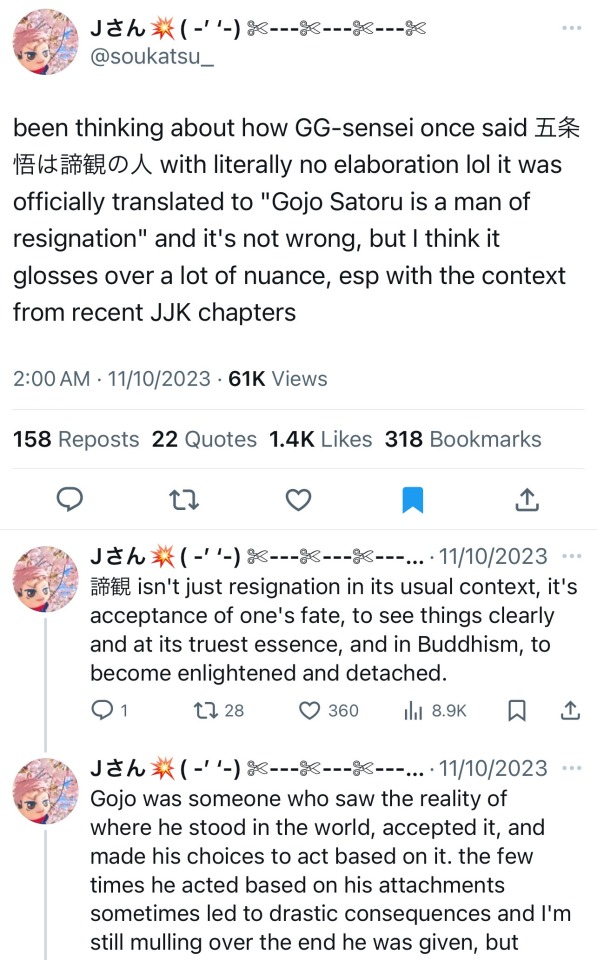
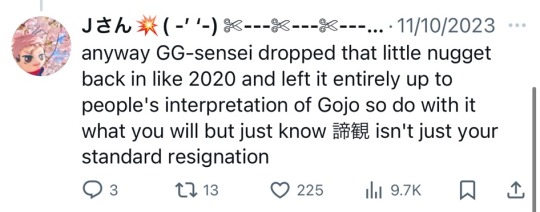
It is a facet of enlightenment - in which the concept of “non-attachment” is a big part of (attachment is viewed as the root of suffering).
We can interpret “resignation” in so many ways, as it explains so much about his immense capacity for love / acceptance, but also his tendency to... simply resign himself to an outcome / fate I guess - a form of passivity that can be either considered positive or negative, perhaps depending on outcome.
Going with the flow, neither chasing nor halting anything in particular with his immense might and potential. He swayed things to gently influence an outcome. Followed a designated path trying to rebuild the sorcerer world through being a teacher... which he couldn’t fully commit too either, because he had a role as a special grade who had to keep working.
That’s not to say he didn’t achieve anything - because of course he did. But nothing revolutionary. He said so himself to Geto: he didn’t see a point in it. There were just some things he didn’t think would change - someone else would replace the higher-ups.
And thus. Despite his massive strength, he never did ever manage to go all out. Perhaps this is symbolic of an inherently gentle/accepting nature? But there was indeed a monster inside him too - the one that thrived on the thrill of killing and defeating. It was a beast he seldom let out. It was a beast with a thirst.
I’ve said it before, and I’ll paraphrase: like a sprinter limited to go at 8kmph, like a singer who is only allowed to whisper her song, a painter unable to use any paints for their desired masterpiece - how dreadfully, painfully unfulfilling.
So of course it was FUN to have this final brawl with Sukuna - to give it his very best, especially when he also didn’t feel lonely anymore with a bunch of monsters he can pass the gauntlet (his body and his will) onto in the worst case scenario.
But of course Gojo doesn’t have the ability to predict the future, so how can anyone expect that he make decisions and judgements perfectly or accurately? All he can do is consider based on his own judgement. Alone. As the only other person who help him plug those holes in his judgement, Geto, had left him.
It is up to interpretation whether Geto was left behind first, but this really isn’t a competition or about assigning blame… because where do we even start?
One cannot hold Gojo totally accountable for things that happen around him or how others interpret his actions. He was born different to everyone else. Probably treated as if he had this role to fill where people had an idea of what they wanted or needed him to be, but never gave much thought over what it would feel like for him.
Gojo, Shoko, and those left behind have had to suffer the same resignation. After all: What else are you supposed to do but resign yourself, in the face of a reality where even to things you don’t wish to happen, have to happen? All you can do is what you can... and if you can, you wield it with all your might.
Geto tried it to the best of his ability.
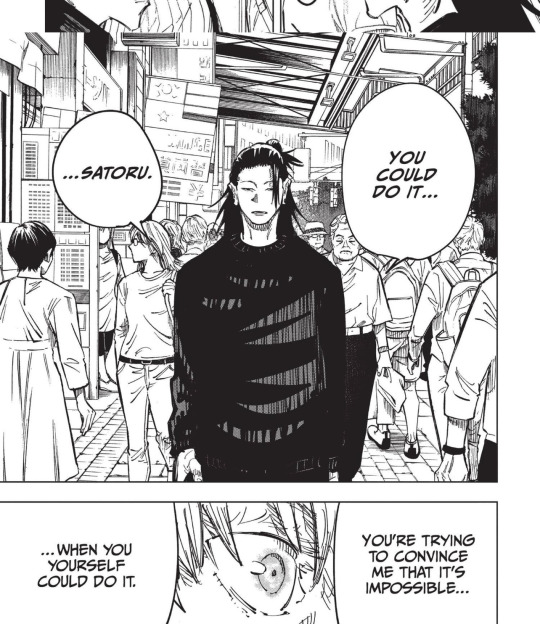
He wasn’t Gojo, who could do it if he wanted to.
Understanding that Gojo wasn’t, and accepting that he (Geto) shouldn’t change that about him (Gojo), as he was likely more suited to be at the school - essentially following nanami’s words and “leaving it to him” as Gojo was in his element / thrived on it, but Geto couldn’t be complicit in the system that would lead them to watch their own kind die one by one — Geto left to follow his ideals.
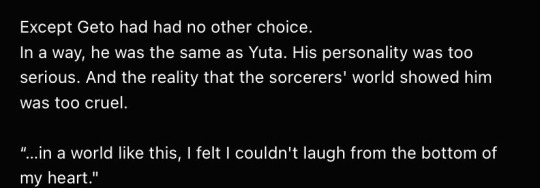
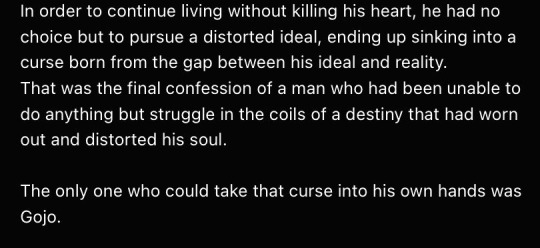
Gojo was referred to as the only one who can take that curse into his own hands. I used to see it as “the only one to kill Geto” after he failed and almost lost his humanity for the sake of power (killing Yuta would go against his principles) but now it also has a new meaning: the only one who can take charge and pursue the ideals to actually change the world.
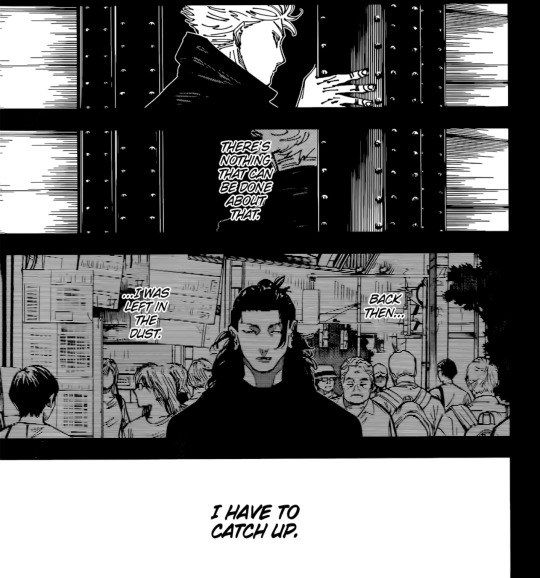
The curse is the sh*t that is in the world of sorcery in jjk. Gojo seemed to (imho) now feel the need to catch up and hold the reins this time.
It is the end of Resignation Man Gojo Satoru. The emergence of The Monster Gojo Satoru (who Geto assisted in helping Gojo keep at bay through being the “model of humanity” that Gojo could follow) who was then fully ready to take the stand. Like Geto on that stage.
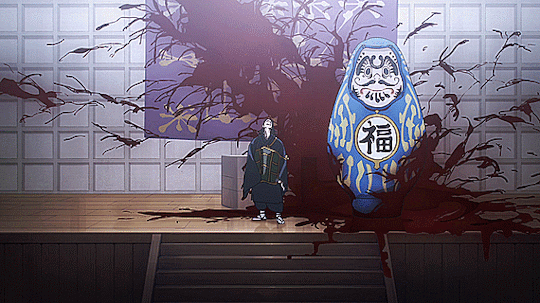
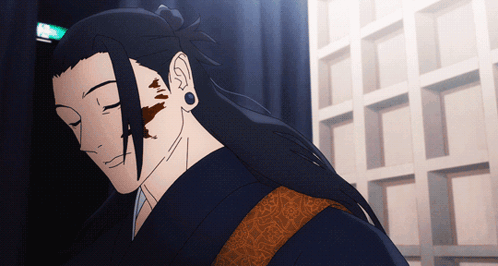
Bye higher ups.
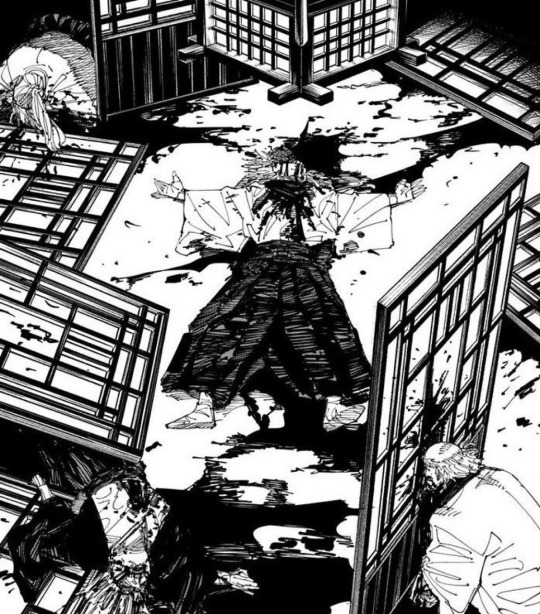
Before, despite his immense strength, he didn’t force his way through. Perhaps this was the outcome of having been forced to be born and live with no choice but to be the six eyes + limitless. You do not actually have freedom.
Unless, you’re willing to become a pariah. To wield these cards that were dealt to you and completely become the extraordinary.
And now, Yuta embraces the same resigned acceptance of becoming a monster. After all... only a few will be able and willing to turn into a Monster.
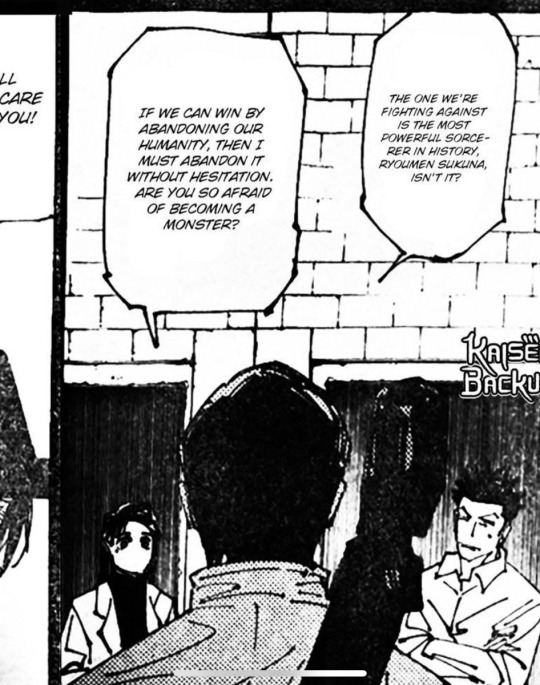
Out of love. A Monstrous love indeed.
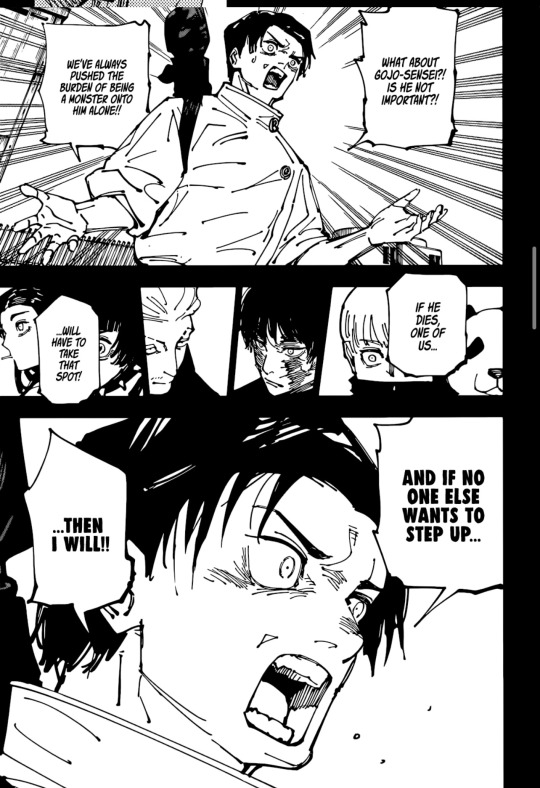
Geto had monstrous motherhood in him. I guess this extends to others now too. To cast away humanity because nobody else will. Nobody else can. So they have to wield it. Become it.
Yuta represents both the old and new world... in some way, he is like Gojo and Geto combined... power / strength + sincerity / kindness. Of course, like the yin and yang, each half has a bit of the other in it - so Gojo and Geto had a combination of power and compassion, but they symbolically represent each,
Arguably, had Geto someone else by his side, things may have been different.
All of this mess… ugh.
It didn’t have to come to this, right? Nor did it have to be the extermination of humans, but it could’ve been a collaboration of the special grades (Yuki, Gojo, Geto) all trying to solve the 3 different factors to the problem: humans as the origin of curses (research), the old-fashioned higher ups + clans, and the elimination of the curses. There may be others, but you get my gist.
But alas, this is the jjk world.
Just some thoughts, I’ll end it here before it’s more word vom.
#gojo resignation man#jjk#jjk 261#jjk leaks#jjk analysis#jjk thoughts#satosugu#jujutsu kaisen#gojo satoru#stsg#geto suguru#jjk spoilers#jjk Yuta#jujutsu kaisen analysis#jujutsu kaisen theories#gojo analysis#yuta okkotsu#jujutsu kaisen spoilers#jjk angst#jjk meta#jujutsu kaisen thoughts#jjk brainrot
244 notes
·
View notes
Text
It genuinely keeps me up at night that when Van Eck attempts to reveal to the Merchant Council that Wylan can’t read, they all react exactly as Wylan feared they would. (Spoilers ahead!) Of course since they don’t believe him and Wylan’s brilliant memory for Jesper’s words protects him we don’t see the full force of their response, but it is made PAINFULLY clear that they all would have responded the same way Van Eck did - “How could you say such things about your own blood?”. It’s an incredibly meaningful and arguably subtle detail that Bardugo implements to remind the reader that although Van Eck was our main antagonist in this case, there is no singular villain in this story because what the characters are fighting is an ultimately unbeatable source. The system is impossible to truly defeat because it is a hydra, we see that when Dryden’s father died he took on the role of the Council and acted the exact same way he did, and if Van Eck had raised Wylan to one day take over from him then he too would have been forcibly moulded into that shape by the poisonous environment of this governing body. The defeat of Van Eck, had Kaz not amended his will to name Wylan his inheritor, would have been only that: the downfall of a singular man, to be easily replaced by another with the same dangerously capitalistic values and crude methods of implementing them. It would not have been any change in the system that oppresses the main characters - I think it’s kind of similar to the Hunger Games (spoilers ahead) when Katniss chooses to kill Coin instead of Snow because she realises that killing Snow doesn’t actually change the system if someone else will simply step into his shoes. We also see this reflected in Kaz and his mission to destroy Rollins, since by doing so he too has taken the actions Rollins did. When Inej points out their similarities he denies it, saying “I don’t sell girls, I don’t con helpless kids out of their money”. Inej replies with the gentle, HEARTBREAKING sentence: “Look at the floor of the Crow Club, Kaz”. And this is so important because Kaz has no consideration for what happens to those people once they step outside his door. How do they fair after he scams them? How many of them have had no other money to fall back on? Did one of them sell their daughter to be able to pay off their debts to him? He’d never know, he just had the money and that’s all he thinks about. But if that girl survived long enough to want revenge, who would she blame? Say she didn’t want to blame her parents, like Kaz doesn’t want to blame Jordie, then who becomes the manifestation of all her hatred, the one thing she has decided that destroying will cure her? Kaz does. Just as Rollins has for him.
Every system of this city is a hydra, and there are so many beautifully written reminders of this without forcing it down our throats, but there is also the hope of genuine, real change. In Wylan, joining the Merchant Council as someone opposed to its views, as someone who has lived in both sides of this city and been abused by both of them, as someone who understands that real change is hard to implement. In Inej, as she journeys against the system that abused her not for revenge, but for the protection of all the children who have been hurt and killed, of all the children being hurt and killed, and of all the children who would have been hurt and killed if she didn’t stop the slavers who sought them, as someone who knows that real change is action. In Jesper, as someone raised far from the suffocating closed-minded atmosphere of the Merchant Council and who can support Wylan through it, as someone who knows that striving for real change is messy and chaotic, but that it’s where he thrives. In Matthias, who died believing that the world could truly change, who died believing in Nina, believing in himself, and believing that his death was a necessary sacrifice to real change, even though he wanted it to be peaceful. In Nina, as someone who had learned that real change cannot always be won with violence, as someone who will learn to use her new power to restructure a civilisation, as someone who will spend the rest of her life striving for change because nothing could ever be worse than her beloved having died in vain. And in Kaz, in the small ways, in the fear of what he could become that will hold him back from becoming the next head of the hydra, in his love for Inej shifting his perception of the world, and in his slow journey of healing, maybe one day killing Rollins will be enough. And if that doesn’t work, he’ll burn the world down and start it all again.
#every so often I start to think I’ve run out of posts for you guys#then something like this hits me#there’s always something new to say#i love it#grishaverse#six of crows#leigh bardugo#crooked kingdom#inej ghafa#kaz brekker#nina zenik#jesper fahey#wylan van eck#matthias helvar#kanej#wesper#helnik#book analysis#fantasy books#soc analysis#soc analyst#soc meta#assorted analsyis - grishaverse
641 notes
·
View notes
Text
Here’s some positivity for introjects who are connected to their source!
There’s no one true or correct way to be an introject - introjects come in all shapes and sizes, and may have a wide variety of ways in which they view their source! Whether a factive, fictive, faitive, objective, conceptive, songtive, or something else, it’s okay for introjects of all sorts to like their source of feel connected to it. If you’re an introject who is connected to your source, this post is for you!
❤️ Shoutout to introjects who identify with their source’s name, gender, pronouns, sexuality, or other identities!
🧡 Shoutout to introjects who kin their sources!
💛 Shoutout to introjects who identify with their source despite having never directly seen or interacted with it!
💚 Shoutout to introjects whose source is their special interest, hyperfixation, or one of their favorite things!
💙 Shoutout to introjects who roleplay or otherwise engage with the world as their source!
💜 Shoutout to introjects who are source divergent or who don’t identify much with their source, but are still deeply connected to it!
❤️ Shoutout to introjects who like being referred to as their source!
🧡 Shoutout to introjects who are tired of their relationship to their source being policed or dictated by others!
💛 Shoutout to introjects who distanced or disconnected from their source, only to reconnect with it later on!
💚 Shoutout to introjects who often feel ostracized or left out of plural spaces because of how they view their source!
💙 Shoutout to introjects whose relationships to their source are intricate, nuanced, or complex!
💜 Shoutout to introjects who go through phases or waves of feeling more or less connected to their source!
Introjects may not literally be their source, but that doesn’t mean they are morally obligated to abandon connections to their source altogether! Introjects can and often do have a wide range of opinions on or relationships to their sources! It’s okay for introjects to love their source or feel strongly connected to it. You’re still just as valid and cherished as an introject, a member of your system, and a member of the plural community just the way you are!
We hope every source-connected introject who sees this can have a lovely day today. Please treat yourself with the kindness and gentleness you deserve, and don’t judge yourself too harshly for how you view your source! Rest assured, you will always be welcome in our spaces without the expectation to change. Thanks so much for reading, and take care!

#multiplicity#plurality#pluralgang#actuallyplural#system positivity#plural positivity#plural pride#system pride#introjects#source talk#fictives#factives#faitives
292 notes
·
View notes
Text
Synastry & Composite Chart Observations

Please do not repost my work on any other social media platform even if you credit me :) Chart readings are still open but I will be closing them again at the end of a October :)
An Aquarius rising in a composite chart can show a couple who go against societal norms and expectations. They can seem like an “odd-pairing” or perhaps there is something unconventional or eccentric about how they appear to the world. Unless Venus or Mars is conjunct the composite ascendant they can seem like friends or a couple who has built a relationship that is strongly based on friendship. Interestingly, couples who have Aquarius on the descendent tend to be more open to long-distance or any other relationship patterns that are considered unconventional (an open relationship as an example).
A Sagittarius rising in a composite chart can indicate that the pair will travel together or learn a lot just by being together. They tend to expand each other’s world views and belief systems. Expansion, knowledge, and exploration are key themes here.
Mercury square Neptune in a composite chart can point to certain misunderstandings or miscommunications in a relationship. It is important for both people to be open and transparent to avoid intentional or unintentional deceit.
Couples with Saturn in the 5th house of their composite chart may have trouble expressing affection towards each other unless there are other mitigating factors. Feelings of ‘fun’ and ‘pleasure’ in the relationship can be stifled with this placement, unless the couple are actively working towards incorporating frequent date nights, vacations, and creative hobbies into their relationship. Some couples with this placement choose not to have kids or have very few.
Many married couples either have a composite Libra rising or have their Sun, Moon, or Venus in the composite 7th house. Saturn on an angle in a composite chart tends to be present in long-term relationship composite charts.
Uranus in the 8th house of a composite chart can indicate financial uncertainty or instability in a relationship. As a couple, they can handle their shared resources and taxes in a manner that can be seen as “haphazard” by some. Their investments as a couple can also undergo many unexpected changes.
When someone’s Moon falls into your 4th house, you may find yourself telling them about your childhood, family life or just very personal/intimate things about yourself. When someone’s Moon is in your 12th house this can also happen. However, you may not always feel very comfortable with how vulnerable you feel around the Moon person (as the 12th house person). It’s almost as if they can see right through you with this overlay. It must be said that the Moon person can at times find the 12th house person to be emotionally elusive (even if the 12th house person feels as if the moon person intuitively understands them).
Composite charts with Venus or the ruler of the composite ascendant in the 12th house often indicates that the relationship is very private or has to be kept hidden for some reason. The composite Sun in the 12th house can also indicate a relationship that is not very public.
When someone’s Venus falls into to 8th house in synastry, they completely transform the way you view or even handle matters related to love, values, and finances. Relationships that are 8th house heavy can be difficult to let go of or forget but they often trigger major personal transformations.
If I were to assign a planet to ‘situationships’ I would definitely assign Neptune. Composite charts that are highly aspected by Neptune or have Neptune closely conjunct the Ascendant, descendent, or midheaven can indicate that the relationship is not always clearly defined or perhaps the two are not always on the same page regarding where the relationship is heading. I read a composite chart for a married couple with Neptune in the 10th house. For them, this just meant that they both had to make career sacrifices to make their relationship work at some point in their marriage. However, I’ve also read a composite chart where Neptune was exactly conjunct the descendent. In this case, the relationship was undefined as one partner refused to commit fully. Although Neptune can create feeling of confusion, it can also show you where the couple can each other immense compassion, selflessness, and grace.
#synastry#astrology#astrology tumblr#astrology observations#astrology blog#astro thoughts#astrologyposts#astro tips#astro posts#astro notes#astrology content#astro blog#astrology tips#astrology community#astrologyreadings#astro tumblr#spirituality
791 notes
·
View notes
Text
To Build Something Else

Whenever I read a fanfiction that takes place in the future where the hero kids continue their schooling as normal and emerge as pro heroes into the existing system, I always kinda view it as like, “AU where things weren’t as bad” or “AU where everyone is still pretending that this is the way things should be” or “AU where good and evil are morally uncomplicated.” I’m not trying to call anybody out—I’ll still read and enjoy these sometimes—but that’s how I’ve always looked at it. I’m starting to notice other people feeling it too. I’ve read fics where they point out how redundant and unfair it is to go back to being students after saving the world (remember how many pros straight up quit and left a bunch of kids to keep fighting?). I’ve seen people acknowledge how trauma will affect their ability to keep going. Perhaps the trickiest thing to wrap our heads around is how the villains will fit into it all if not through death, punishment, or imprisonment. What about all the other trappings of society? The heavily regulated quirk use, the government-funded pros aiding police control and contributing to cover-ups that maintain the illusion of peace. Hero idolization, quirk counseling, civilian helplessness. Judging a person’s worth or character based on their quirk…
It would sound too obvious and cheesy to simply point out that society isn’t “just the way things are,” that change is possible. We all know this, and yet we struggle to pinpoint exactly where to aim our sights, find the source, make any meaningful progress. The other day I read some articles from my university’s student newspaper around 1970, and it made me feel sick wondering if progress is really an illusion. Fact is, it’s easy to intellectually deconstruct society, but very difficult to imagine how to build something else.
In this fictional world, heroes have offered a mythical vision of safety and triumph. When All Might arrived, everything was going to be okay. But let’s not forget how this story began: with a moment where All Might paused, like a bystander, and in his place, a desperate civilian kid hurtled forward without any common sense. If you ask me, it wasn’t that Izuku was so good and pure and selfless, it was that he disregarded everything.
And so the person who “saves the world” (if we can even reduce it to such a concept) is not the person who puts everyone at ease and makes crowds cheer. It’s the person who makes everyone hold their breath, with a feeling in the air like the pressure changed, and it smells like rain. It is natural to be worried about the future. It’s honest. It means you can see what’s really going on. Hero society has never felt this exposed, but the people are held back from the edge of despair because there is also so much potential brewing. Electricity about to strike. The world will NOT go back to the way it was, no matter what. That much is certain. But what if we still live to see the dawn? What then? What if one person’s courage to break the mold makes all the difference?
I’m not just talking about Izuku, you know. I’m talking about Horikoshi.
To an extent, I’ve given up on predicting how exactly things will play out, because if nothing else, I can tell he’s planning something big—so big, I can’t quite picture it. I’m watching and waiting for the one person who can. I just know where he’s coming from. I think about how he’s never come this far before because his other stories were snuffed out. I know he used to struggle to see the future of his career. I relate to his stubbornly rebellious resolve to do what he wants anyway. To keep dreaming. I know that emotional sincerity is his specialty. And now he’s even directly breaking the fourth wall, having characters talk about what’s supposed to happen in comic books. Gradually, almost imperceptibly at first, we’ve been shown how something else can happen. He’s not done yet.
#listening to bastille's give me the future album again and feeling things#bnha 416#bnha 417#bnha manga#mha#boku no hero academia#my hero academia#midoriya izuku#all might#bnha meta#lin speaks#bakudeku#dekubaku#bkdk#dkbk
235 notes
·
View notes
Text
The way everyone now took up in arms blaming women and girls for the elections results and young men turning into the far right truly made something click in me, literally everyone and their grandpa is blaming women, even groups who hate each others are now bonding together like besties just to blame women, so excuse me for ranting on tumblr.com, this is gonna be long :)
What's been happening lately really opened my eyes to how hypocritical everyone is, what's everyone only ever good at is pointing their fingers at women and throwing the blame at us, misogyny and violence against women in all its shapes and forms since the dawn of time till these days didn't cause women to go out on the streets and murder men in masses, yet apparently misandry is real and some comments online made by the evil feminists were enough to radicalize young men and turn them into far right incels and are to blame for the elections in the US, women are always to blame for everything, I'm not surprised with this coming from men but to see women spewing this dumb bullshit too is so disheartening, to me you're no different than the conservatives who blame women for men's "loneliness epidemic" instead of encouraging them to start treating us better, teenage boys and men are shouting "your body our choice" at little girls and young women yet all you fuckers can take from that is that these girls and women are somehow to blame for it!!! A 19 yo girl typing I HATE MEN on her silly little Facebook page or reddit discord after years of nothing but stories of rape and misogyny in the news and in her neighborhood and her school and her home and literally fucking everywhere is to blame for men and boys being radicalized actually, meanwhile the internet is filled with men sharing rape videos and their violent fantasies about us and then they go out in real life shouting and smirking at us admitting how badly they want to strip us of our rights!!
Teenage boys are watching violent porn, men gang rape teenage girls, women and girls get trafficked, raped, beaten, murdered on the daily around the globe, it's statistically proven that husbands mistreat and abuse their wives on such a high scale even in first world countries, not to mention the daily misogyny and sexsism we face, men don't even need to get "radicalized", the majority of men out their don't want us to reach them and be "nicer" to them like you preach, they simply want power over us and to misuse that power, and women and girls who recognize this and see it clearly in the world we live in right now and the thousands of years of recorded history we have and not even to mention personal experiences are the ones to blame... for being aware of it and acknowledging it and demanding change!!!! How fucking dumb are you, or maybe you're just a pretentious hypocrite :)
No one's ever blamed these boys and men for me and other women to end up having radical feminism views, nah they're too busy calling us demented and mentally ill and lecturing us about how to treat men better lest we fail them and blaming us for everything wrong with the world!
Ever since I got introduced to radical feminism and found myself agreeing with some of its ideas and arguments I was always still critical and sometimes even wary of it and never really called myself one, but now if I get totally sucked into it and get "radicalized" myself it's actually all your fault, how about that? Congratulations, centuries of men raping us and creating endless systems to oppress us in unimaginable ways didn't radicalize me, you and your hypocrisy did that instead :)
Honestly fuck all of you dumb shitheads, you can't gaslight us into cuddling men while they keep beating us bloody, I've had enough!
#y'all I'm radicalized now so you better cuddle and baby me while I go out in the streets harassing little boys and shouting kill all men#how does that sound? two can play this game#can you smell the burning sarcasm :)#waiting for all of you to come tell me I'm being emotional and should put the phone down and go touch some grass#like I said I'm radicalized now so you better be nicer to me in order to get me to listen to you 😛#may delete this later cause I can't deal with the amount of brainrot y'all suffer from#radblr#radical feminism#radical feminist safe#radical feminists do interact#radical feminists do touch#us elections
57 notes
·
View notes
Text
One type of fanfic i just cannot read is future Anya fics because they always get her wrong. And i get it this is just how future fics work but i feel it's important to remember that Anya is only the way she is currently because she is a child and to me on of the most important parts of the story is how much being adopted by Twilight changed her life and put her on the trajectory for growth that she otherwise would have been denied.
Anya is only stupid today. She is going to grow into a brilliant girl regardless of what happens. It always feels so regressive seeing her be portrayed as childish and clueless even after living with a spy and attending Eden for 10+ years.
To understand why Anya is going to become smart you have to understand why she is stupid first.
(note: i am not referring to academic intellect but rather social skills, logic, reasoning and general awareness. Whether or not Anya spends the rest of her life failing maths and writing like she's having a stroke is beyond me and completely irrelevant to my point)
One of the major issues with the computer science world is AI and Data Analytics because for decades people have been pouring time and money into developing these sophisticated computers that are able to accurately emulate the human mind and intelligence to be used in automation and data processing. They’re now left with 2 issues: Big data (so much unprocessed data that has been gathered and sat uninterpreted) and human-dependent AI (AI systems that are overly reliant on human interaction they become more of a hassle than an aid). In other words the computers are very smart but they just don’t know what to do with all the information and in the end just return garbage.
Anya has a similar dilemma. She is very capable. Her mind reading abilities enable her to gather information like no other the problem is she doesn’t actually know how to use that information in a meaningful way. Throughout the manga we see her attempting (and even succeeding) to use her powers for her own advantage. But because of her age and lack of education the ways she can use her powers are limited.
Anya shows great attention to detail and clearly has good hindsight. She’s somewhat reactive but it’s obvious she still considers what impact her actions may have in the long term, she’s always trying to make the best move she just doesn’t know that many moves and her imagination is juvenile. We regular see Anya trying to gain intel on Damian so that she can use it to get closer to him and progress on plan B.
One example is with the dogs, she thinks if Damian sees she has a dog that they will have something to talk about and hopefully he’ll want to spend more time with her. The problems comes with Anya’s thinking and it hinders her approach. Rather than view it as an opportunity to find commonality she sees at a chance to impress him, and in the end it fails because Damian sees her as just trying to brag and show off rather than trying to make a genuine connection. Anya acts this way because she’s 5 and doesn’t really know how to socialize or relate to people.
In this situation she had two important pieces of information: 1) Damian has a dog that he likes and 2) Damian struggles with making friends and thinks everyone is just trying to exploit him. It’s that second part she fumbles and ends up making Damian feel even more guarded around her. She doesn’t have the fully developed emotional intelligence to understand and relate with Damian in a way that’s actually beneficial. But the thing is she can learn.
And so when you write future fics of Anya and she’s still the same erratic braggadocios little girl you’re effectively overlooking on her best traits, her awareness. Anya isn’t stupid she just doesn’t know how to be smart and that’s what makes her act so stupid.
For me, when writing future Anya, I think of all the people in her life, their specific skills and strengths and how Anya can use those to become a better more well rounded person. Specifically, Twilight and Handler. The Handler thing is more of a hc but Twilight has shown interest in Anya beyond the mission.
One of my favourite scenes is when they’re looking out the window and he asks to try and guess which person so most likely to be a spy, she assumes it’s the person who looks the strangest but he explains that a good spy is able to blend it and stand out the least. This changes Anya’s understanding of human behavior, it teaches a good trick to going unnoticed and gives her a detail to look out for when trying to find a mole/spy. It’s a small moment but it provides a lot of information that she can use later on in her life. Although nothing like that really happens again we can assume he continues to give her little tidbits of advice and information on espionage work as well as her seeing him in action (not really in a mission but just the way he operates) will teach her how to interpret situations in a way that can actually help her.
So not only does Anya have access to a lot of information, she knows the value of the information and she’s learning how to use that information. And that’s why I’m always confused when people write her in the future and she still can’t figure out that Damian likes her. ITS NOT REALISTIC.
And I’m not saying she’s gonna become all cool and suave when she grows up. I don’t think her personality is going to change much. In fact I think she’s going to deliberately avoid changing her personality, or at least her public persona. Anya will use people’s perception of her as childish and stupid to make herself less suspicious and trustworthy. (Also I don’t think she’s gonna change that much anyways bc that’s not how people work) but when thinking for her perspective she’s gonna be more aware and observant.
This rant is gotta long and it’s kinda nonsensical so I’m gonna stop here but please stop writing Anya as a stupid adult. It’s annoying and so boring.
But in the end it’s your fanfic do what you want 🥰❤️
84 notes
·
View notes